CATHOLIC CONNECTION
-the women’s issue-


-the women’s issue-

PUBLISHER
Bishop Francis I. Malone
EDITOR
Kierstin Richter
CONTRIBUTORS
Mike Van Vranken
Kim Long
Mary Arcement Alexander
Rosalba Quiroz
Polly Maciulski
Trey Woodham
Karen Dill
Tristan Frisk
Karl Yabut
Delia Barr
Kathy Schimschock
EDITORIAL BOARD
Deacon Mike Whitehead
John Mark Willcox
Kim Long
Kate Rhea
Rosalba Quiroz
Fr. Matthew Long
Dr. Carynn Wiggins
Fr. Pat Madden
SUBSCRIPTIONS & ADDRESS CHANGES
Contact: Blanca Vice
Email: bvice@dioshpt.org
Write: The Catholic Connection 3500 Fairfield Ave. Shreveport, LA 71104
Call: 318-868-4441
Fax: 318-868-4609
SUBMISSIONS
Contact: Kierstin Richter
Email: krichter@dioshpt.org
The Catholic Connection is a member of the Catholic Press Association.
The Diocese of Shreveport complies with Virtus’ Protecting God’s Children program. (www.virtus.org) Classes are offered every second Wednesday of the month at the Catholic Center in Shreveport. Online sessions are also available.
To report child sexual abuse by a cleric or church worker in the Diocese of Shreveport, call your local law enforcement agency and Mary Katherine Arcement, Diocesan Victim Assistance Minister at 318-584-2411.
The Catholic Connection is a monthly publication funded by your Diocesan Stewardship Appeal; mailed to every known Catholic household in the Diocese of Shreveport. Our mission is to advance knowledge and understanding of our Catholic faith among the faithful. We seek to foster the application of Christ’s teachings and our church’s mission in our daily lives and to encourage our sense of Catholic identity within our family, parish, and faith community.
“Much of what we find in the eyes of Jesus must first have been in the eyes of Mary. The mother’s vision is powerfully communicated to her children. Mary had to be his first spiritual director, the one who humanly gave a life vision to Jesus, who taught Jesus how to believe and how to feel his feelings. What was in Jesus’ eyes was somehow first in hers.
+Adapted from Radical Grace: Daily Meditations, pp. 153–154
A good friend of mine (Katelyn, right up there in the middle) always refers to a woman’s heart as “the womb” for others. She puts it much more eloquently than I can, but what she means is that a woman, regardless of whether or not she has children, has this innate sense of creating a safe haven for those around her - a “womb” for others, if you will. A spiritually healthy woman has an essence about her that makes others feel safe, so they feel loved, so they feel seen, and so they feel heard.
If there’s one place I feel completely safe, seen, and heard, it’s my grandparents’ house. Spaghetti and gravy hot and ready, peanut butter pie waiting in the fridge, and totally undivided attention sitting to talk at the kitchen table. It’s a place you feel comforted, appreciated, loved, and most of all, very well fed.
Love in the eyes of a mother, a grandmother, or even a close friend is something that has a certain transforming
quality we all need. It’s this safe haven where we feel loved and cared for, wrapped in a nurturing warmth only a woman can provide.
This month, I challenge you to slow down and focus on being a safe haven for others - for your friends, your family, your kids. Anyone you meet. There are some things we can learn from books and others that have to be felt to be known. Learning to be a nurturing and loving presence for others is something that can only be learned by sitting in the holy presence of divine love.
This month, sit in the presence of our Blessed Mother. Meditate on nothing but just sitting beside her, maybe as she listens to your cries or complaints and combs through your hair. Imagine her placing her hand over yours, saying in a delicate, but maternal voice, “It’s okay. I love you. My son loves you. You are a part of this Holy Family.”
With that, I welcome you to the September “Women’s Issue” of The Catholic Connection. Wives, mothers, grandmothers, daughters, single women, sisters, and working women, we thank all of you for the beauty you give to this world. Thank you for your love, your intellect, your talents and passions, and your dedication to making this world a beautiful place. You are loved, you are appreciated, and you are embodying the light of Christ everywhere you go.
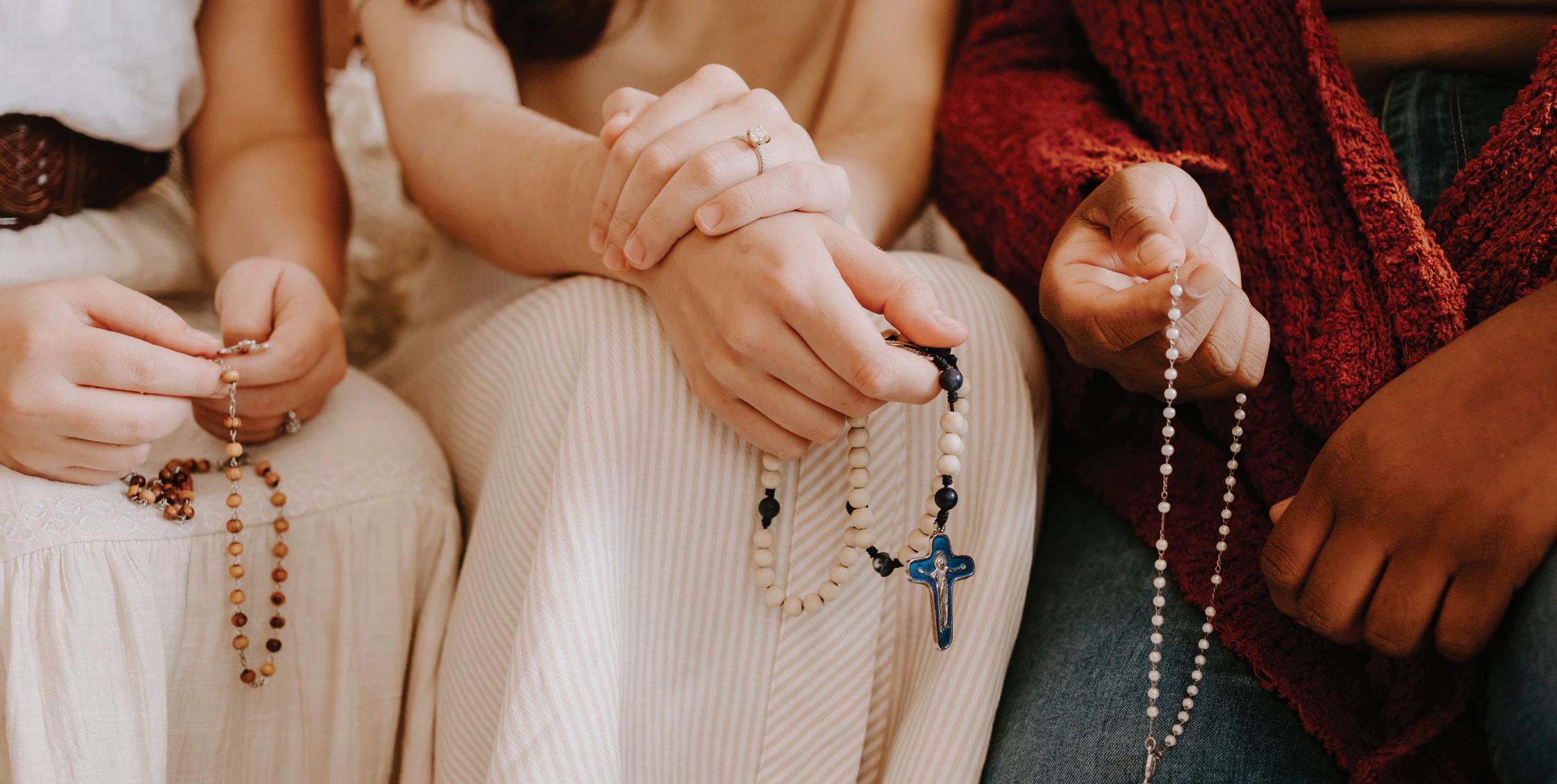
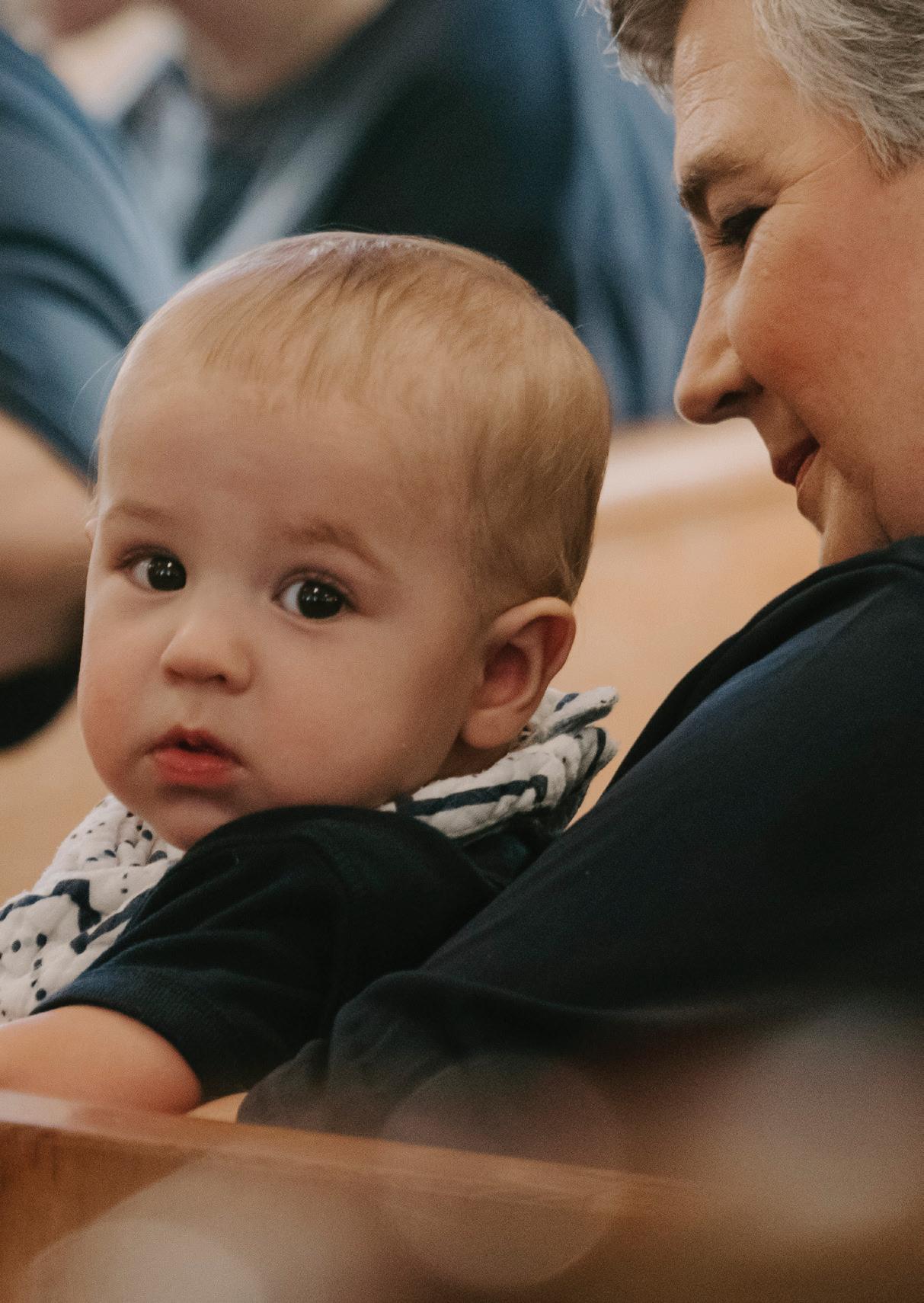
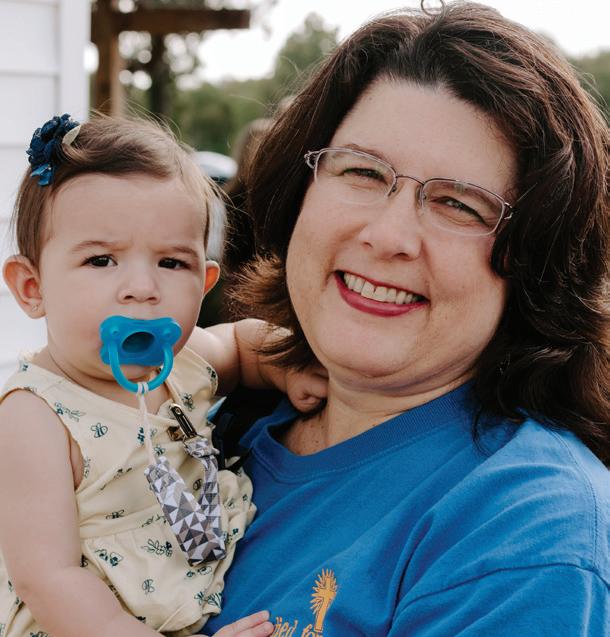
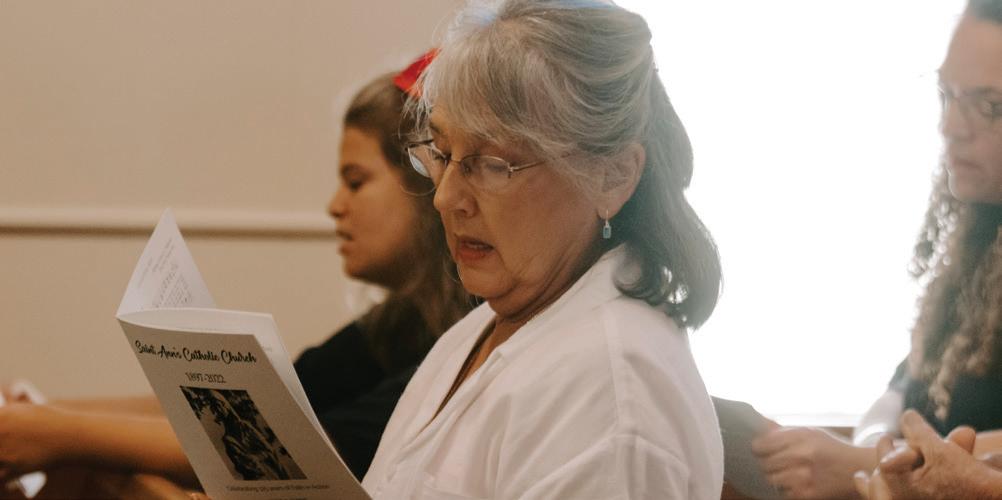

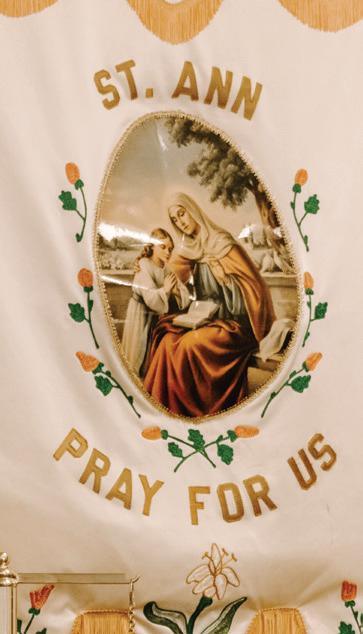
So much has happened in the past fifty years that have had a tremendous impact on the life of the Church that involves women. But my initial approach to this article is to highlight my background with women – as a gift from the Lord to me. Let me begin:

I am one of nine children, five boys and four girls. I was sandwiched between my four sisters, two directly older than me, and two immediately following me. While I can attest that I am very close to my sisters, there was a natural challenge to being right there in the middle of them. I think they would say, if given the opportunity, that I was a typical “brother” to them, and in my youth, getting into my share of trouble doing the things brothers do to irritate his sisters. Time has a way of healing, of course, and my time with my sisters, as we matured into adults, has been a blessing, and we are very close. My oldest sister, Maureen, died the week I was announced Bishop of Shreveport. It was a blessed death – as she was ready to meet the Lord when it was her time. Needless to say, the eight remaining siblings miss her very much. Maureen was a very simple person, never having married or had children, she nannied most of her adult life, and possessed an innocence that stayed with her throughout her life. With her, my other three sisters helped me to grow up with shared responsibilities and family life. We lost our mother when we were young, and though her memory is still quite fresh, almost sixty years after her passing, my mother had a profound influence upon us all. These were the women of my youth…but, not completely.
For the years of elementary education, I was taught by the Sisters of Saint Joseph. They were not strange to us as my great aunt was a member of that Order, and a frequent presence in our young lives. My First, Second, Fourth and Fifth Grade Sisters are still living. I had the privilege of celebrating my Second Grade Sister’s 70th anniversary of Profession last August. We have remained close all these years, as is my memory of the wonderful and blessed women of Consecrated Life in my youth.
My first assignment as a priest was aligned with Benedictine Sisters, and for three wonderful years as a young priest I taught at Mount Saint Mary Academy, run by the Sisters of Mercy –some of them as collaborators in education, some of them as my
superiors at the Academy. In 1983 I was assigned to a parish in Northwest Arkansas, an assignment that included being Chaplain of the local Catholic Hospital, run by the Dominican Sisters from Springfield, Illinois. I celebrated Mass for them each day, ministered to the sick in the hospital, and shared my meals with them. I also prayed with them daily, and took my daily directions, in part, from them. These women remain a blessed memory to my priesthood.
For thirty some years as a priest in the Diocese of Little Rock, most of the collaborators in Chancery and Tribunal work were women. Some of them were receptionists, secretaries, heads of Departments, and leaders in the local Church. No parish church could function without them, and they form the leadership of parish life, assisting their pastors in making the parish run effectively and efficiently.
In truth, most priests and bishops will tell you that they are surrounded – more – by women than by men – quite a contrast to fifty years ago. I have been blessed throughout my 45 plus years in ministry to have been surrounded by them – even today. Recently, we celebrated the feast of Mary Magdalene – the apostle to the apostles. The Church is blessed beyond compare by the presence of the Mother of the Lord, our mother, Mary. It is safe to say too, that the synodal process possesses the strength it does by the participation of women around the table. They are visible to us, not just as Readers at Mass, Eucharistic Ministers at Mass and to the sick, members of Parish and Finance Councils. Some or most of our parishes have organizations that are comprised of the women of the parish – and the larger Church continues to thrive on spiritual movements which involve these sacred women, for example, those who are involved in Spiritual Direction and retreat work.
All of this is to say that among the greatest gifts to humanity, and especially to the life of the Church is the presence of women –sacred women – holy women, the young, the seasoned, the wives and mothers, the spiritual leaders of the flock. Please appreciate them for who they are and what they do, and “Holy Mother the Church,” is aptly named after them. God bless them all!
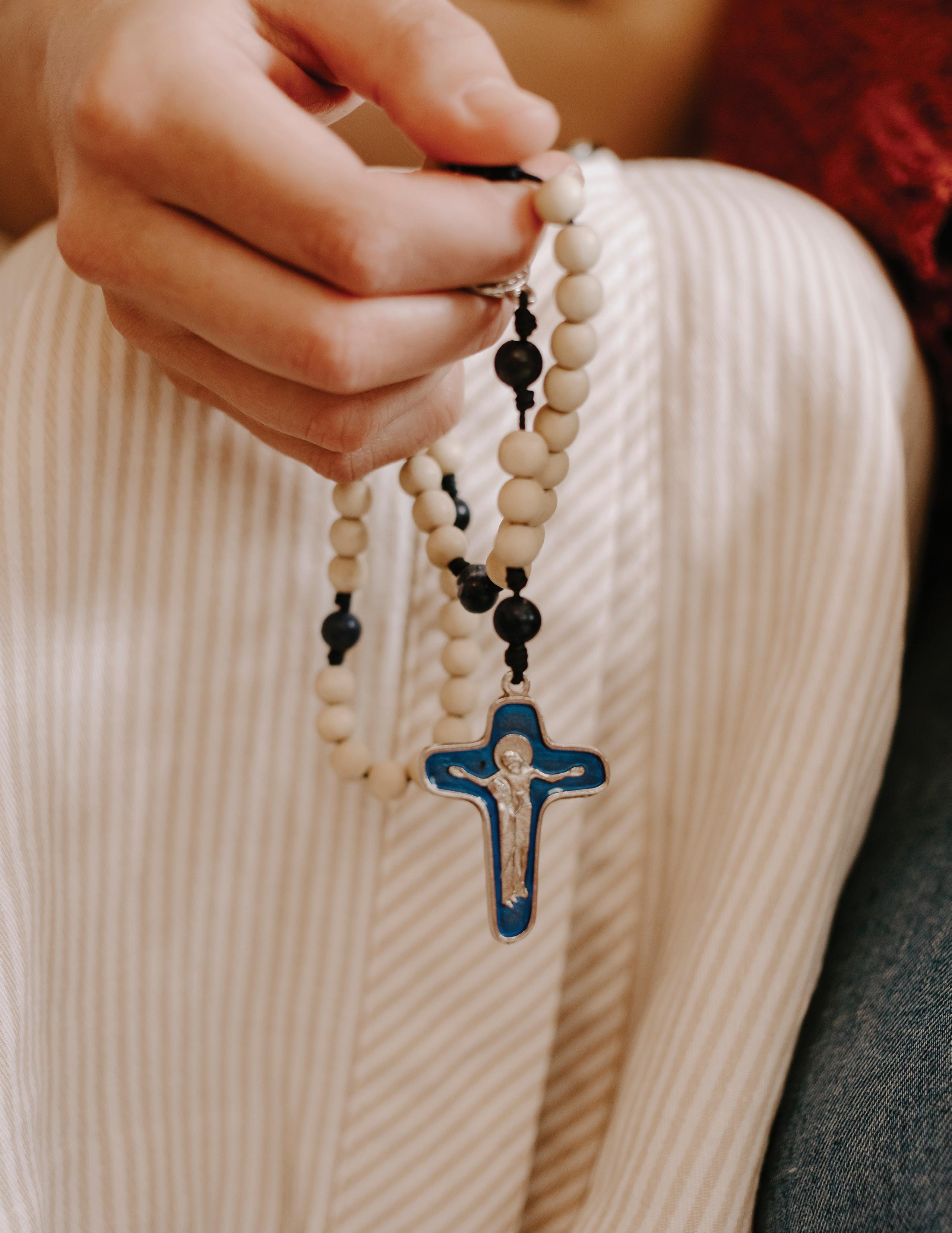
The following is a collection of excerpts from Pope John Paul II’s 1995 Letter to Women. All credit goes to the Vatican website archives. The full letter can be found on the Vatican website.
Picture: Katelyn Arabie, Kierstin Richter
Thank you, women who are mothers! You have sheltered human beings within yourselves in a unique experience of joy and travail. This experience makes you become God’s own smile upon the newborn child, the one who guides your child’s first steps, who helps it to grow, and who is the anchor as the child makes its way along the journey of life.
Thank you, women who are wives! You irrevocably join your future to that of your husbands, in a relationship of mutual giving, at the service of love and life.
Thank you, women who are daughters and women who are sisters! Into the heart of the family, and then of all society, you bring the richness of your sensitivity, your intuitiveness, your generosity and fidelity.
Thank you, women who work! You are present and active in every area of life-social, economic, cultural, artistic and political. In this way you make an indispensable contribution to the growth of a culture which unites reason and feeling, to a model of life ever open to the sense of “mystery”, to the establishment of economic and political structures ever more worthy of humanity.
Thank you, consecrated women! Following the example of the greatest of women, the Mother of Jesus Christ, the Incarnate Word, you open yourselves with obedience and fidelity to the gift of God’s love. You help the Church and all mankind to experience a “spousal” relationship to God, one which magnificently expresses the fellowship which God wishes to establish with his creatures.
Thank you, every woman, for the simple fact of being a woman! Through the insight which is so much a part of your womanhood you enrich the world’s understanding and help to make human relations more honest and authentic.
I know of course that simply saying thank you is not enough. Unfortunately, we are heirs to a history which has conditioned us to a remarkable extent. In every time and place, this conditioning has been an obstacle to the progress of women. Women’s dignity has often been unacknowledged and their prerogatives misrepresented; they have often been relegated to the margins of society and even reduced to servitude. This has prevented women from truly being themselves and it has resulted in a spiritual impoverishment of humanity. Certainly it is no easy task to assign the blame for this, considering the many kinds of cultural conditioning which down the centuries have shaped ways of thinking and acting. And if objective blame, especially in particular historical contexts, has belonged to not just a few members of the Church, for this
I am truly sorry. May this regret be transformed, on the part of the whole Church, into a renewed commitment of fidelity to the Gospel vision. When it comes to setting women free from every kind of exploitation and domination, the Gospel contains an ever relevant message which goes back to the attitude of Jesus Christ himself. Transcending the established norms of his own culture, Jesus treated women with openness, respect, acceptance and tenderness. In this way he honoured the dignity which women have always possessed according to God’s plan and in his love. As we look to Christ at the end of this Second Millennium, it is natural to ask ourselves: how much of his message has been heard and acted upon?
Yes, it is time to examine the past with courage, to assign responsibility where it is due in a review of the long history of humanity. Women have contributed to that history as much as men and, more often than not, they did so in much more difficult conditions. I think particularly of those women who loved culture and art, and devoted their lives to them in spite of the fact that they were frequently at a disadvantage from the start, excluded from equal educational opportunities, underestimated, ignored and not given credit for their intellectual contributions. Sadly, very little of women’s achievements in history can be registered by the science of history. But even though time may have buried the documentary evidence of those achievements, their beneficent influence can be felt as a force which has shaped the lives of successive generations, right up to our own. To this great, immense feminine “tradition” humanity owes a debt which can never be repaid. Yet how many women have been and continue to be valued more for their physical appearance than for their skill, their professionalism, their intellectual abilities, their deep sensitivity; in a word, the very dignity of their being!
And what shall we say of the obstacles which in so many parts of the world still keep women from being fully integrated into social, political and economic life? We need only think of how the gift of motherhood is often penalized rather than rewarded, even though humanity owes its very survival to this gift. Certainly, much remains to be done to prevent discrimination against those who have chosen to be wives and mothers. As far as personal rights are concerned, there is an urgent need to achieve real equality in every area: equal pay for equal work, protection for working mothers, fairness in career advancements, equality of spouses with regard to family rights and the recognition of everything that is part of the rights and duties of citizens in a democratic State.
This is a matter of justice but also of necessity. Women will increasingly play a part in the solution of the serious problems of the future: leisure time, the quality of life, migration, social
services, euthanasia, drugs, health care, the ecology, etc. In all these areas a greater presence of women in society will prove most valuable, for it will help to manifest the contradictions present when society is organized solely according to the criteria of efficiency and productivity, and it will force systems to be redesigned in a way which favours the processes of humanization which mark the “civilization of love.”
Then too, when we look at one of the most sensitive aspects of the situation of women in the world, how can we not mention the long and degrading history, albeit often an “underground” history, of violence against women in the area of sexuality? At the threshold of the Third Millennium we cannot remain indifferent and resigned before this phenomenon. The time has come to condemn vigorously the types of sexual violence which frequently have women for their object and to pass laws which effectively defend them from such violence. Nor can we fail, in the name of the respect due to the human person, to condemn the widespread hedonistic and commercial culture which encourages the systematic exploitation of sexuality and corrupts even very young girls into letting their bodies be used for profit.
In contrast to these sorts of perversion, what great appreciation must be shown to those women who, with a heroic love for the child they have conceived, proceed with a pregnancy resulting from the injustice of rape. Here we are thinking of atrocities perpetrated not only in situations of war, still so common in the world, but also in societies which are blessed by prosperity and peace and yet are often corrupted by a culture of hedonistic permissiveness which aggravates tendencies to aggressive male behaviour. In these cases the choice to have an abortion always remains a grave sin. But before being something to blame on the woman, it is a crime for which guilt needs to be attributed to men and to the complicity of the general social environment.
My word of thanks to women thus becomes a heartfelt appeal that everyone, and in a special way States and international institutions, should make every effort to ensure that women regain full respect for their dignity and role. Here I cannot fail to express my admiration for those women of good will who have devoted their lives to defending the dignity of womanhood by fighting for their basic social, economic and political rights, demonstrating courageous initiative at a time when this was considered extremely inappropriate, the sign of a lack of femininity, a manifestation of exhibitionism, and even a sin!
In this year’s World Day of Peace Message, I noted that when one looks at the great process of women’s liberation, “the journey has been a difficult and complicated one and, at times, not without its share of mistakes. But it has been substantially a positive one, even if it is still unfinished, due to the many
obstacles which, in various parts of the world, still prevent women from being acknowledged, respected, and appreciated in their own special dignity” (No. 4).
This journey must go on! But I am convinced that the secret of making speedy progress in achieving full respect for women and their identity involves more than simply the condemnation of discrimination and injustices, necessary though this may be. Such respect must first and foremost be won through an effective and intelligent campaign for the promotion of women, concentrating on all areas of women’s life and beginning with a universal recognition of the dignity of women. Our ability to recognize this dignity, in spite of historical conditioning, comes from the use of reason itself, which is able to understand the law of God written in the heart of every human being. More than anything else, the word of God enables us to grasp clearly the ultimate anthropological basis of the dignity of women, making it evident as a part of God’s plan for humanity.
It is thus my hope, dear sisters, that you will reflect carefully on what it means to speak of the “genius of Women.” Not only in order to be able to see in this phrase a specific part of God’s plan which needs to be accepted and appreciated, but also in order to let this genius be more fully expressed in the life of society as a whole, as well as in the life of the Church. This subject came up frequently during the Marian Year and I myself dwelt on it at length in my Apostolic Letter Mulieris Dignitatem (1988). In addition, this year in the Letter which I customarily send to priests for Holy Thursday, I invited them to reread Mulieris Dignitatem and reflect on the important roles which women have played in their lives as mothers, sisters and co-workers in the apostolate. This is another aspect-different from the conjugal aspect, but also important-of that “help” which women, according to the Book of Genesis, are called to give to men.
The Church sees in Mary the highest expression of the “feminine genius” and she finds in her a source of constant inspiration. Mary called herself the “handmaid of the Lord” (Lk 1:38). Through obedience to the Word of God she accepted her lofty yet not easy vocation as wife and mother in the family of Nazareth. Putting herself at God’s service, she also put herself at the service of others: a service of love. Precisely through this service Mary was able to experience in her life a mysterious, but authentic “reign”. It is not by chance that she is invoked as “Queen of heaven and earth”. The entire community of believers thus invokes her; many nations and peoples call upon her as their “Queen”. For her, “to reign” is to serve! Her service is “to reign”!
This is the way in which authority needs to be understood, both in the family and in society and the Church. Each person’s fundamental vocation is revealed in this “reigning”, for each person has been created in the “image” of the One who is Lord of heaven and earth and called to be his adopted son or daughter in Christ. Man is the only creature on earth “which God willed for its own sake,” as the Second Vatican Council teaches; it significantly adds that man “cannot fully find himself except through a sincere gift of self” (Gaudium et Spes, 24).
The maternal “reign” of Mary consists in this. She who was, in all her being, a gift for her Son, has also become a gift for the sons and daughters of the whole human race, awakening profound trust in those who seek her guidance along the difficult paths of life on the way to their definitive and transcendent destiny. Each one reaches this final goal by fidelity to his or her own vocation; this goal provides meaning and direction for the earthly labours of men and women alike.
In this perspective of “service”-which, when it is carried out with freedom, reciprocity and love, expresses the truly “royal” nature of mankind-one can also appreciate that the presence of a certain diversity of roles is in no way prejudicial to women, provided that this diversity is not the result of an arbitrary imposition, but is rather an expression of what is specific to being male and female. This issue also has a particular application within the Church. If Christ-by his free and sovereign choice, clearly attested to by the Gospel and by the Church’s constant Tradition-entrusted only to men the task of being an “icon” of his countenance as “shepherd” and “bridegroom” of the Church through the exercise of the ministerial priesthood, this in no way detracts from the role of women, or for that matter from the role of the other members of the Church who are not ordained to the sacred ministry, since all share equally in the dignity proper to the “common priesthood” based on Baptism. These role distinctions should not be viewed in accordance with the criteria of functionality typical in human societies. Rather they must be understood according to the particular criteria of the sacramental economy, i.e. the economy of “signs” which God freely chooses in order to become present in the midst of humanity.
Furthermore, precisely in line with this economy of signs, even if apart from the sacramental sphere, there is great significance to that “womanhood” which was lived in such a sublime way by Mary. In fact, there is present in the “womanhood” of a woman who believes, and especially in a woman who is “consecrated,” a kind of inherent “prophecy” (cf. Mulieris Dignitatem, 29), a powerfully evocative symbolism, a highly significant “iconic character”, which finds its full realization in Mary and which also aptly expresses the very essence of the
Church as a community consecrated with the integrity of a “virgin” heart to become the “bride” of Christ and “mother” of believers. When we consider the “iconic” complementarity of male and female roles, two of the Church’s essential dimensions are seen in a clearer light: the “Marian” principle and the Apostolic- Petrine principle (cf. ibid., 27).
On the other hand-as I wrote to priests in this year’s Holy Thursday Letter-the ministerial priesthood, according to Christ’s plan, “is an expression not of domination but of service” (No. 7). The Church urgently needs, in her daily selfrenewal in the light of the Word of God, to emphasize this fact ever more clearly, both by developing the spirit of communion and by carefully fostering all those means of participation which are properly hers, and also by showing respect for and promoting the diverse personal and communal charisms which the Spirit of God bestows for the building up of the Christian community and the service of humanity.
In this vast domain of service, the Church’s two-thousand-year history, for all its historical conditioning, has truly experienced the “genius of woman;” from the heart of the Church there have emerged women of the highest calibre who have left an impressive and beneficial mark in history. I think of the great line of woman martyrs, saints and famous mystics. In a particular way I think of Saint Catherine of Siena and of Saint Teresa of Avila, whom Pope Paul VI of happy memory granted the title of Doctors of the Church. And how can we overlook the many women, inspired by faith, who were responsible for initiatives of extraordinary social importance, especially in serving the poorest of the poor? The life of the Church in the Third Millennium will certainly not be lacking in new and surprising manifestations of “the feminine genius.”
From the Vatican, 29 June 1995, the Solemnity of Saints Peter and Paul.
The Church sees in Mary the highest expression of the “feminine genius” and she finds in her a source of constant inspiration.

While these are only a few of the questions being asked, and while many seem to already have the answers, most of us are still seeking the graces of wisdom, understanding, and guidance where these questions are concerned. For those of you who continue to search for meaning and answers, and for those of you who would like validation of the answers you’ve already discerned, may I invite you to consider spiritual contemplation as you explore the possibilities of the future of the Roman Catholic Church.
My favorite definition of contemplation is to “take a long, loving look at the real.” The “real” in this case is the universal institution we call “the Church.” This long, loving look does not happen in one sitting. In fact, it’s a life-long endeavor. Are you willing to make the investment of gazing at the Church with the eyes of longing, and the heart of love, all in a vulnerable honesty that welcomes with open arms everything you are about to see? This is what true contemplation is all about.
As I’m sure you know, the Synod on Synodality summary document for the listening sessions held in the Diocese of Shreveport is now available to everyone on our diocesan website. This document will be a valuable resource (although certainly not the only one) as we, with loving scrutiny, humbly gaze on our beloved Church. I invite you to visit the diocesan website now, open the document, read it, print it, make it readily available for your frequent (daily?) contemplative prayer periods to converse with God as you gaze on the Church of Jesus Christ.
To prepare for your contemplative prayer, I advise a special, quiet, comfortable place to pray if you do not already have one. I also suggest using a journal; nothing fancy, a spiral notebook will do.You might open each prayer session with some gesture as you recognize God’s holy presence. Consider praying for the graces of an open heart, open mind, and insight of God’s will for his Church. Importantly, we all need to pray for the grace of letting go of our own desires, and humbly ask God for his desires and his only. I don’t know about you, but this is pretty hard for me!
Now use the document to gaze on the realities of all we heard in our listening sessions. Pray with only one at a time. Pray with that one subject for days, weeks or even
months. Have very frank and open conversations with God about how all of this makes you feel. Ask if those feelings are coming from God or from another source. Patiently sit, listen, and wait for God’s response. It may come immediately. It may take longer. If you need encouragement read these words from the late Father Pierre Teilhard de Chardin:
“Above all, trust in the slow work of God.
We are quite naturally impatient in everything to reach the end without delay. We should like to skip the intermediate stages. We are impatient of being on the way to something unknown, something new.
And yet it is the law of all progress that it is made by passing through some stages of instability—and that it may take a very long time.
And so, I think it is with you; your ideas mature gradually—let them grow, let them shape themselves, without undue haste. Don’t try to force them on, as though you could be today what time (that is to say, grace and circumstances acting on your own good will) will make of you tomorrow.
Only God could say what this new spirit gradually forming within you will be. Give Our Lord the benefit of believing that his hand is leading you and accept the anxiety of feeling yourself in suspense and incomplete.”
This all may sound like a lot of work. Well, it is! Discipleship has its costs. We find that it’s much easier to learn and memorize theology and catechisms than it is to actually live what they teach. Yet, the future of the Church depends on our lived experiences as a Church. While what we know is critical to the equation, it will not mean a lot until we live it in this post-modern world. Contemplation forces our ongoing conversion. It changes us and calls us to something new.
And when you feel tired and weary, go to Jesus, and find rest. Learn from him as he is meek and humble of heart (Mt. 11:29). Ask yourself: “How important is the Church to me?”
Then, joyfully go back to your contemplative prayer sessions. If we all do this together, the future of the Church will be the holy people of God engaging in His creation doing exactly all He desires. What more could we ask for?
We hear a lot of talk today about the future of the Church. Where is she headed? How healthy is she? How does she engage the people of God? Why, oh why, are so many people leaving?

The following is the completed document prepared as a synthesis of the many listening sessions held around the Diocese of Shreveport in the Spring of 2022, also including input emailed directly to the diocesan synod committee. There was no intent for this to be a word-for-word verbatim from everything we heard. Rather, we hope we have captured the passion, spirit and the overarching themes contributed by all those interested in the future of our diocese. An exact copy of this document was electronically sent to the United States Conference of Catholic Bishops group on Synodality, who will further enmesh it with the documents they receive from other dioceses around the country. That completed report will be used by the world wide Church when drafting an agenda for the Synod on Synodality to be held in the fall of 2023.
While the listening session phase is complete, the work for all of us has just begun. First and foremost, we are called to continue to listen to each other, the Church, and especially those who normally do not have a voice to share with us. Remember, the initial goal of this was to help us learn to listen. Additionally, we believe you will find ideas in the following report that can be acted upon immediately at both the parish and the diocesan levels. Some of these action items will require money. They will all demand our time and talents.
Bishop Malone is now making plans to visit each and every parish for further listening, communication, and sharing. Of course, he is only one person, so it would be easy to assume this process will take at least a year. However, the fruit of his visits will help form the work and identity of the diocese for years to come.
We ask you to please read, study, and pray with the following. This too could take a year. We suggest keeping a journal for notes, meditation, and follow-up. Form small discussion groups. Share ideas with your pastor and parish pastoral council. And through it all, continue to ask yourself: “What do I hear in each statement?” “How does it make me feel?” “Where are those feelings coming from?” “God, how do you want me to respond?”
Our synodal experience began in October 2021 with communications from our bishop to the entire diocese through a letter read at every Mass, as well as using several videos hosted by the bishop and a few lay persons, posted on our diocesan website and social media. Beginning in the Spring of 2022, listening sessions were offered at many of our diocesan parishes. We also received personal input by email from Catholics from around the diocese.
Determining a percentage of participation from the approximate 40,000 Catholics in our diocese is impossible. However, we were pleased and even surprised by the number of those interested enough to attend the listening sessions or to submit their comments through email. Once the listening sessions began around the diocese, we were uplifted and inspired by the content.
Through the listening sessions and what we heard in the emails; we were touched by the spirituality of our diocese. Or, put another way, the lived experiences of North Louisiana Catholics came alive in the heartfelt and passionate sharing of stories and events of personal and communal encounters with God in the lives of those who shared.
Although not surprising, an overwhelming number of comments came with the feeling that “my group” is not listened to. Whether elderly, youth, male, female, preference of liturgy type, or any other group one could imagine, they all needed to express how they feel their own group is “on the margins” and not recognized or listened to. We concluded that in at least some way, they are all correct. We sometimes have an easier time talking than listening, underlining our need to look at synodality in the first place. We now find ourselves with the long-term desire to practice fully listening to each other. Through prayerful discernment we have attempted to synthesize all of the contributions we heard into this working document.
Similar to the early Church’s division of understanding about the nature of Christ (divinity vs humanity), a topic still in evolutionary understanding today, we are faced with similar divisions with theology vs spirituality, liberal vs conservative, styles of liturgy, gender identity, Catholic social teaching, divorce and remarriage, and many more. We continued to hear the hope for a utilization of new and universal language which better defines and describes these positions leading to a “center” of understanding that eliminates confusion. Several told us they have been attacked by other Catholics because of their beliefs, so they remain quiet and unengaged. We can do better.
There is now, and have been over the decades, a common passionate desire for more priestly and religious vocations.
Additional discussion and comments include:
• Among those were some who were pleading for female ordinations. One person shared that it’s time we accepted all of those whom God calls. They have been praying their entire lifetime for more vocations and they feel the answer to those prayers has been “no.” Imagining God answering the prayer, they hear God say: “No, I’m not going to give you more vocations to celibate males. If you want more priests, you are going to have to ordain everyone I call to the priesthood. This includes married males, as well as women (celibate and married). Right now, you are accepting fewer than 50% of those whom I call.”
• One person suggested a total renewal of seminary training for priests, including a rewrite of curriculum to include greater emphasis on social justice, sharing of resources with the needy and further understanding of the inclusiveness of the phrase “People of God.” A bright and robust future for our diocese will include a large and diverse Catholic population from every walk of life acting in both leadership and member roles, knowing and living our faith in everyday life.
• Teach priests how to pastor.Then we can hire, train, and pay lay administrators.
Many expressed that marriage and family are at the heart of a vibrant parish and Church. Most parishes suggested providing events with food where we can invite family, workmates, and neighbors, offering a very brief message about who Jesus is personally to us. There was a desire to see encouragement for families to pray together.
Additional discussion and comments include:
• Rules on marriage/weddings (inside church, divorced/ communion) should be updated with help from the laity.
• Birth control should be approved by the church
• We need to have a central diocesan natural family planning course instead of just telling engaged couples (and anyone else) to find an Online course on their own.
• Many church fees for marriage are too expensive and deterring for lower income Catholics to marry in the Church. We should not be charging for the sacraments.
• Annulment process is still too lengthy and invasive
• Inclusion of divorced and remarried in family
• Inclusion of singles in family
• Inclusion of widowed in family
Easily, we can attest that the most often expressed theme we heard was the importance and necessity of the celebration of the Eucharist. As always, this is what brings us together in the most holy of ways. There was some consensus that we do our best to never allow our churches to be shut down again. At the same time, some shared the grace that virtual Mass was to them and how they still experienced the broader community even attending virtually. We heard requests for education on the Mass, including a desire for quiet before Mass and other liturgical options. Mass is the common life of the parish. There were calls for a more simple Mass with less intrusive music, as well as requests for complex Masses using many of the options of additional music, prayers, sacramentals and gestures.
Additional Discussions and Comments include:
• Female ordination
• Women Homilists
• Annulment process seems punitive, not restorative
• Divorced and remarried without an annulment should be able to receive communion
• Homilies on current events/issues/common life
• Mass more personalized (anniversaries & birthdays)
• More healing Masses
• Cultural adaptability of the liturgy
• Latin Mass
• Please request quiet before Mass so that those in prayer and reflection have the time of quiet with the divine.
• So many prayer and liturgy opportunities are designed for retirees. People who work are not able to participate in the Masses or other ministries.
• Make Mass more accessible and understandable to nonCatholics, maybe a program or some other guide.
• Adoration, new opportunities of liturgical celebrations, different prayer opportunities, easier for non-Catholics to participate, offer nursery.
• What is our mission beyond the brief sentences in our mission statements?
• Good use of contemporary music
• It is insulting and harmful for a priest to tell us what the appropriate and non-appropriate music for liturgy is. God touches our artistic senses in diverse ways. No one knows what is appropriate or not appropriate for any one person other than that person themselves.
• Many felt their parish goes to great lengths to be liturgically sound.
• Maybe using the talents and ideas of various age groups to participate in the programs or liturgies would bring more people to Mass.
• Just need the laity to (in many cases, to continue) encourage greater participation amongst each other.
• Seasonal prayer and liturgical celebrations outside of Advent/ Lent.
• Focus on reverence and respect for the Eucharist.
• Youth Masses, modern music, more music that the congregation can sing to.
• Some Masses seem like a concert more than a liturgy.
We heard input on the everyday administration of our parishes and the diocese. Some view the administration responsibilities of the diocese as few and incidental. On the other hand, others feel it is the engine that makes everything happen. It is important that our diocese create a Department of Strategic Planning, whose members would at least include representatives from every individual and group mentioned in this document. There are many Catholic professional associations who could help us set the standards for all of our activities and endeavors.
Additional discussion and comments include:
• Transparency of scandals/financials
• Bishop visibility and availability
• Better communication from diocese on issues
• Frustration over diocese and parishes not supporting Catholic Charities financially
• Include women more in administration + decision making
• Also include youth, families, divorced, ethnic groups, all marginalized people
• At the diocesan level, create departments for: Catholic Spirituality (including but not limited to liturgy), LGBTQ, Adult Singles, The Elderly, Catholic Outreach, and Prison Ministry that includes legal, employment and education assistance.
• Allow pastors to be pastors and hire lay people to be responsible for the administration.
• Lay leaders including canon lawyers, hospital chaplains who can also anoint the sick, prison chaplains, spiritual directors, youth ministers, catechists - preachers, and parish administrators.
• Our use of all mediums to communicate is lame. We have diverse desires in how we want to be communicated to. Find ways to communicate to everyone
We heard the phrase Catholic Social Teaching more than once. It is an area that puts legs to our doctrine and encourages us to minister to others. Catholic Charities, the Society of St.Vincent de Paul, Christian Service, Community Renewal, Mary’s House, and many others are foundational to our opportunities to be Christ to others.
Additional discussion and comments include:
• Catholic college ministry
• Catholic action in north Louisiana (prayer services for murders)
• Campus ministry needs more support
• More participation from adult children
• “Seasons of life” groups
• More accepting of minorities
• Bridge builders
• How do we clarify the work and mission of Vatican II into the current practices and ministries?
We heard a continuous calling (begging) for a diocesan and parish investment in Catholic education at every age level and including all subject matter. This included a cry for trained and paid lay teachers of all ages who would be inspired to commit to teaching, not only what we believe but how we live it in the real world.
• Additional discussion and comments include:
• Some would like more teaching about abortion, asking should it be allowed for people who aren’t Catholic, should it be or not be the dominant issue, and can we have a deeper understanding of why people get abortions.
• Others desire more discussion on topics like addiction, mental health, pornography, poverty, immigration, current and former prison inmates, wealth disparities, the documents of Vatican II, etc
• Clarification on Catholic teaching (to both Catholics and nonCatholics)
• Revive and expand the Greco Institute as part of our adult education and development
• Catechesis on dogma and doctrine of the Church, and how to live these spiritually in the post-modern world
• One suggested a plea for encyclicals on Gaudium et spes and Lumen Gentium
Our Church and its members often get maligned by liberal Christians and secular liberals because of its (depending on the specific issue) moderately-to-very conservative views on gender and sexuality. And, predictably, the rest of Catholic social doctrine gets routinely ignored or worse. However, it is important that Catholics remember that our Church also teaches the following (and I would really like to see at least one other Christian denomination get on board with the first on the list):
1. The principle of the Universal Destination of Goods - that every human being has the right to a share of the goods of creation sufficient to realize his or her fullest potential as a human being simply by right of being born.
2. The right to join and be represented by a trade union or a professional association.
3. The right to full employment.
4. The right to a just and living wage.
5. The right to fair, safe, and reasonable working conditions.
6. The right to security of employment.
7. The condemnation of the death penalty.
8. The condemnation of racism.
9. The affirmation that every single human being is created in the image and likeness of God.
10. The affirmation of the necessity of care for, and protection of, the environment.
11. The affirmation of just treatment of animals.
13. The just distribution and redistribution of wealth.
14. The defense of the rights and dignity of immigrants and migrants.
15. The defense of the rights and dignity of the poor.
16. The principle of the “Preferential Option for the Poor”.
17. The principle of the sovereignty of conscience.
18. The principle that labor must always take precedence over capital.
19. The right of workers to strike.
20. Affirming that workers with disabilities have the same rights as other workers.
21. The right to discharge freely one’s religious duties/ freedom of religion.
22. Affirming the dignity and rights of human persons regardless of personal convictions.
23. Affirming the priority of ethics over profit in all economic decision making.
24. Affirming the priority of ethics in the development of technology.
25. Affirming the necessity of nuclear disarmament.
In every institution, youth is the future. Pope Francis has expressed to our youth, they are not only our future, but our present. Yet, the facts have escaped none of us. More and more of our youth become disengaged and detached from the Church, its sacraments, liturgies, and its grace-filled life. We heard this lament from many and understand everyone’s concern. We are defining youth as those from our youngest ages to those in their forty-something ages. The vitality of the Church needs them all. Consequently, our ministry as a diocese must include new and creative ways to invite and include them, as people of God, into full fellowship with the Church. One group stated our youth needs more opportunities to have a voice in the Church.
Additional discussion and comments include:
I’m heartbroken because my grown children and their children do not engage in the life of the Church
We need well paid and trained youth directors, surrounded by a team of trained men and women whose ministry is to help the youth see their place in the Church and feel welcome in the Church.
 Mike Van Vranken, Spiritual Director
Mike Van Vranken, Spiritual Director
The author of the gospel of Luke seems to do his best to turn conventional thinking upside down, especially how he uses Jesus’ words concerning discipleship, or how we follow him. I have to admit I have read and studied these scriptures so many times, it is easy for me to sometimes fail to hear what Jesus is saying. So, thankfully, Luke continues to remind us that there is a great expense or price tag if we really want to follow Christ. Jesus counsels us by saying things like, if you were going to build a tower, wouldn’t you sit down and analyze the cost so you don’t look foolish when you realize you cannot afford what you set out to build? He not only describes these costs with wonderful metaphors, but he also even asks us, aren’t you going to calculate if you really want to spend everything on me?
Some of those metaphors are: unless one “hates his mother and father” he cannot follow me, or “whoever does not carry his own cross and come after me is not my disciple”. Do these statements not turn your thoughts of an abundant life upside down? They sure do mine. Luke Timothy Johnson explains Jesus’ term “hate” where mother and father is concerned, as not about a feeling towards one’s parents but one’s attitude when it comes to following Jesus and living in his kingdom (Lk 14:26-27). No one or nothing can be more important than living the disciple’s calling. Carrying one’s own cross implies a thought-out decision, maybe every day, maybe every moment, to continue to bear the sufferings of the world to live like Jesus did.
But the punchline hits us right in the gut. “Every one of you who does not renounce all his possessions cannot be my disciple” (Lk 14:33). Said another way: “No servant can serve two masters. He will either hate the one and love the other or be devoted to one and despise the other. You cannot serve God and mammon” (Lk 16:13). If I can read this and it doesn’t make me squirm just a little, I’m either not processing the message, or I am already perfect. No, as often as I have read these Jesus statements about hating mother and father, carrying my own cross each day, renouncing all my possessions, and serving only one master, I still squirm – a lot!
And I eventually come back to this one question: “Am I willing to pay the entire cost of following Jesus?”
At age 36, I found myself 75 pounds overweight and lying in a bed with no ability to get up and walk because of back pain. After four back surgeries, months of missing work, therapy, and years of an entirely new lifestyle of exercise and diet, all helping me lose many of those extra pounds, I knew I had done all I could, and it all lead to my being successful at making healthy changes. But over time, I realized that I had to continue to let go of additional unhealthy habits to maintain my new self. I look back at it all now and realize, it has cost me a lot of what I used to enjoy to become more healthy today. And the costs never end. Periodically, I do sit and weigh the costs and discern that it’s all worth it. The exercise, the nutrition, adequate sleep . . . it’s all worth the cost. But what about my vocation of following Jesus? Are all those costs’ worth it? And what are the additional costs I haven’t experienced yet? Will I be willing to pay them?
In Lk 18:18-23, Jesus is helping a rich official answer these same questions. In short, Jesus tells him it’s really good that the official keeps all the commandments, but there is still more. He says to sell all your possessions, give to the poor, and THEN you can come follow me. For that man, at least in that moment, the cost of following Jesus was too great, and he went away feeling pretty bad about it. Yet, he still walked away.
How about you? Have you ever sat down and calculated the cost of following Jesus? Is there some price that you are not willing to pay? Is Jesus asking you to let go of something right now that is getting in the way of your relationship with him? Is he asking you to give more love and mercy, including to yourself? Maybe he wants you to spend more intimate time talking to him? Maybe he wants you to help others heal? Maybe he’d like for you to give up an addiction to certain foods or alcohol. Are you willing to ask him?
The costs of being a disciple of Christ are endless. He asks us to be “all in” for him. Do you realize the cost? Is it worth it?
Lord Jesus, teach me to be generous. Teach me to serve as you deserve, to give and not to count the cost, to fight and not to heed the wounds, to labor and not to seek to rest, to give of myself and not ask for a reward, except the reward of knowing that I am doing your will.
-Ignatius Loyola

Hometown: Haughton, LA
Mailing Address:
St. Joseph Seminary and Abbey College
P.O. Box 567 St. Benedict, LA 70457.
Birthday: May 3
It was seven years ago when I heard the Call to the Priesthood. It was in September of 2015 and I was in my freshman year at Haughton High School. Now it is September 2022 and I am in my senior year at St. Joseph Seminary and Abbey College. What an incredible walk it has been down this path from meeting all types of new people like different parishioners, seminarians, priests, and bishops. Truly, all these people have helped me in my continuation to persevere in seminary. They have taught me how to not only look forward to my vocation in the future as a priest but to look and appreciate my vocation now even as a seminarian because of the great blessings God has given me in light of the people he has put into my life.
As I look back at and remember God’s Call in my life, I also wonder how it is that I was able to hear His voice. I believe that there were two ways that I had cultivated in my life that opened the ear of my heart to hearing God’s Call for me. The first and most important way was prayer. I prayed to the Lord, like we all do, because of the struggles with people that were close to me and struggles inside of me that I did not know how to handle. These problems weighed heavy on my mind and heart, and so I prayed fervently and consistently for God’s help, His Goodness, His Love, Himself. I prayed to God saying, “I know you love me but why do I still go through this suffering? I know you are good but why do I see more evil than good in my life? Help me God to be better, that I may be good and love as you love, please! Show me your goodness, Oh Lord”! The Lord gave answer and because of my cultivated listening, I heard Him. This had only happened because I grew into listening more and more from being obedient to my parents, school teachers, family members, martial arts teachers, and
through my conversations with friends who listened to me just as much as I had ever listened to them. This is how I came to hear the Lord speak to me: through our relationship deepened by my prayer, asking for His help, and listening to hear Him tell me “I am with you always”, that He loves me more than I might ever know, and watch how He revealed his vocation to me through His priests.
I was able to continue my growth in my vocation this past summer. I was assigned to my home parish St. Jude in Benton, LA. I was put under the guidance of Father Karl Daigle, who has been a priest for 25 years this year, to learn his pastoral and spiritual knowledge and with that to pray and think about it and hopefully use such knowledge going forward in ministry. This summer I worked about every week at the parish office and served all Sunday Masses. In June, I was able to go a few times to visit the sick at the hospital, sit in on meetings with parishioners about to get married, hear those who need spiritual advice in dealing with the end of their life, and leading a rosary at a visitation for the repose of a man’s eternal life. In July, though I got to serve two weddings, I was greeted with many more invitations to come eat and visit with people at their homes. This was an incredible gift to me, as many seminarians and priests know, because it brings joy to us who can come to know more and spend time with our people and their families and sometimes become a part of their family. I
was blessed to meet the Gonzales family (pictured above), a bright and fun family, in July 1 and was invited and went to their house four times before going back to school. They are a family of six with ages from three years old to eighteen years old. I was also able to assist in two Vacation Bible Schools with one at St. Jude and the other at St. Joseph in Zwolle, LA. At St. Joseph’s in Zwolle, I also took part in a Discernment Retreat for Young Men as they thought about having a vocation to the Priesthood as well as learning more about how to pray and live out their faith with other men their age. This was an exciting opportunity to talk to and learn about younger men, their hopes and struggles, and their questions about how to live out their faith through their humanity.
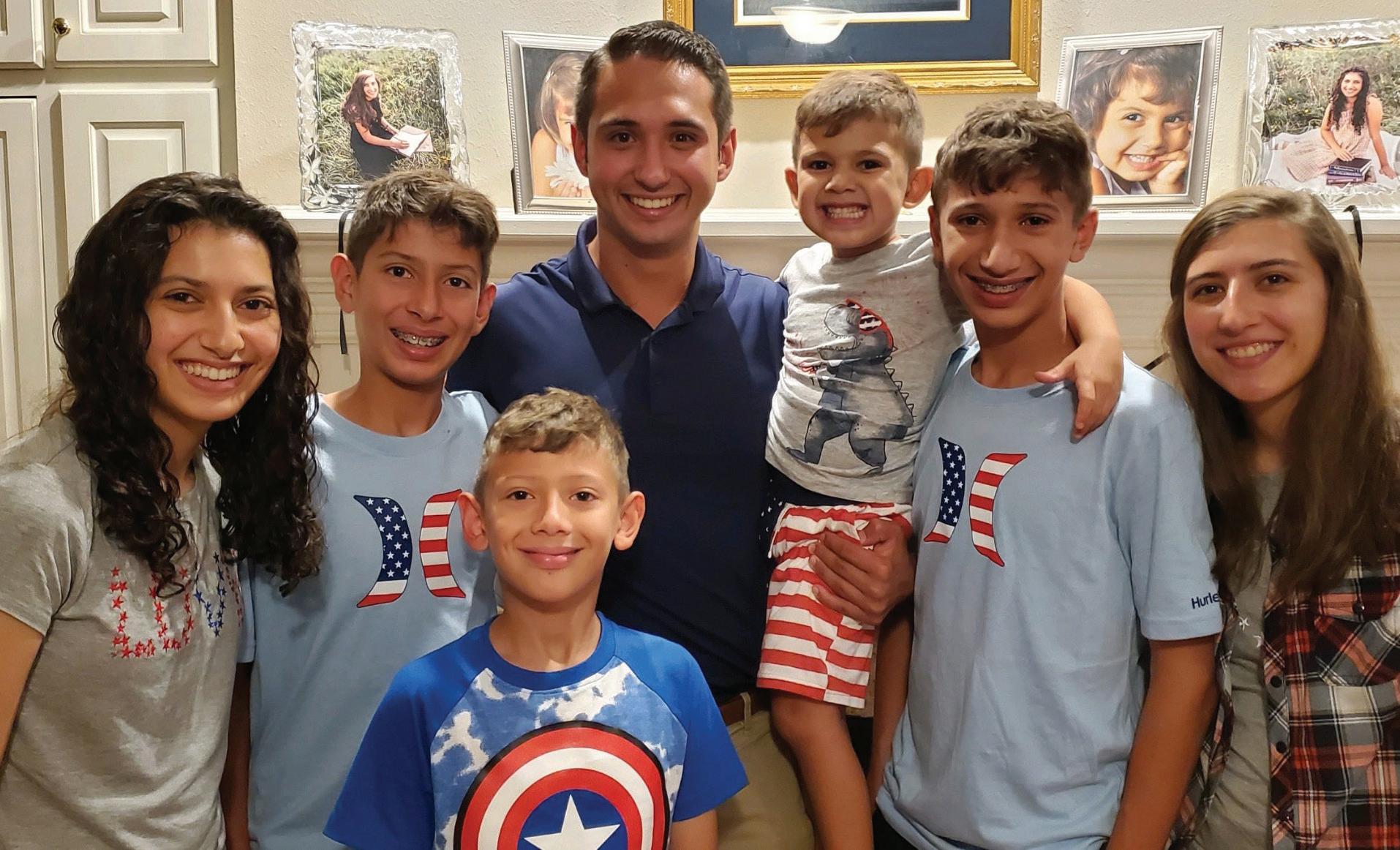
As I enter into my Fourth Year at St. Joseph Seminary and Abbey College, I look forward to many things and here are just a few.This year, I have been elected Hospitality Committee Head which means that I will be in charge of taking care of all seminarian guests and their visit, including their lodging accommodations, and hope to keep the Benedictan hospitality for all guests to be “received as Christ.”
I am very interested in all my philosophy classes as I go deeper into the study of knowledge and words which complement one another. One cannot come to greater knowledge without using words and words are better understood through expansion of knowledge. And one of the greatest things I will look forward to is a deepening of existing relationships with seminarian friends, from my diocese and other dioceses, and Benedictan monks, as well as new relationships with incoming seminarians. Thank you, the good people of Shreveport, for your support and know I look forward to coming back as one of your priests, God willing!
DAILY MASS
The sacrifice of the Mass is the Church’s greatest prayer of praise. At Mass we are fed and nourished by God’s Word and the Body and Blood of Christ.
This is a powerful way to grow in love for the Eucharistic Lord and to grow in the spiritual life.
DAILY PRAYER
Daily Prayer is time set aside for God alone, usually in a quiet place at a specific time each day. Developing the daily habit and pattern of prayer will help the young man to hear more clearly the call of the Lord.
Speaking with a priest about one’s prayer life and seeking his advice on a regular basis is very helpful as one discerns a vocation to the priesthood.
Examples: a weekend retreat at the seminary, vocation weekends of recollection, like “Come and See” Weekend at St. Ben’s Seminary.
Get involved in some form of service with the Church. For example; outreach to the poor, teaching religious education, lecture, taking Holy Communion to the sick, working with the youth of the parish, etc. are ways to give one a taste of “ministry” and can also increase one’s desire for ministry and service.
Praying the rosary daily and seeking the powerful intercession of the Blessed Virgin Mary is recommended when a young man is discerning a vocation to the priesthood. The Blessed Mother had to respond to her vocation. She is most helpful in helping others obtain the grace to do the same.
To obtain further information about seminary and priestly life. The Vocations Director can also help one’s discernment… just call for an appointment.
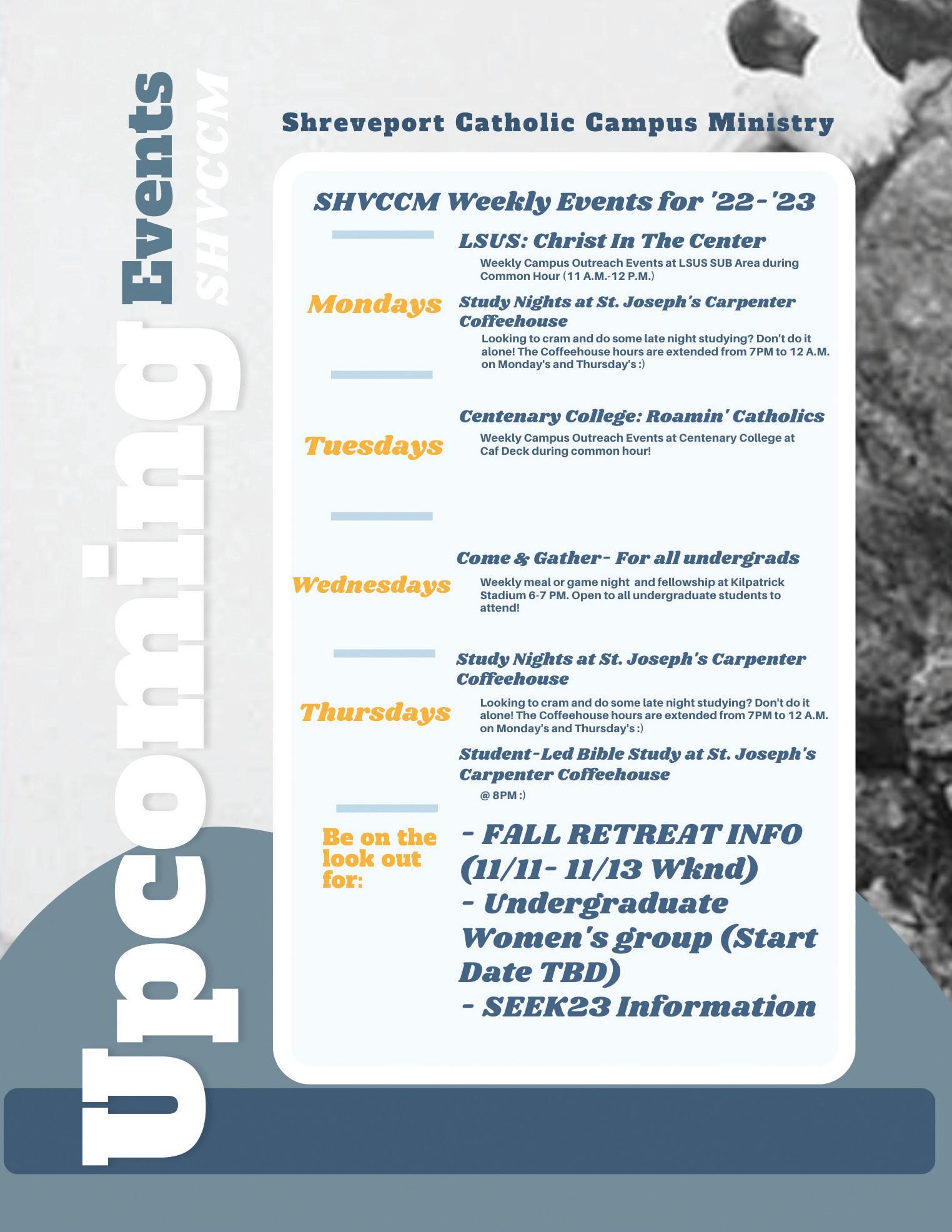
Events don’t make disciples, you do.
Yes, you read that correctly. It’s a common concept that seemingly becomes overshadowed in the hopes to have an impactful evening. It may seem paradoxical coming from someone who invites college students to attend weekly events or gatherings, but hopefully by the end of this article, you’ll see what I mean. The newly formed undergraduate student leadership team for Shreveport’s Catholic Campus Ministry has been hard at work in planning events and retreats for the upcoming school year. However, they know that these events are not the bread and butter of Campus Ministry, rather, it is their desire to build intentional relationships with the new students they meet that will make life-long missionary disciples of Jesus Christ. As much as I’m using this article as a call to action, it may eventually be a reminder for me as the school year steam rolls.
In Sherry Weddell’s, Forming Intentional Disciples, one of her key points discusses the need for the laity to help their shepherds in finding the lost sheep. In St. Paul VI’s Evangelii Nuntiandi, he reminds us that “All Christians are called to this witness, and in this way they can be real evangelizers”. In Mark 1:17 Jesus told His disciples, “Follow me and I will make you fishers of men.” So what does this actually mean? Am I actually rippin’ people’s lips? (fishing joke) No, not at all! It was a community. It was in being immersed in a group of friends who consistently called you to action that allowed for me to grow in holiness.
I remember during my freshman year of college, my friends would invite me to attend 7 A.M. daily Mass with them at St. Matthew’s Catholic Church in Monroe. They knew that the likelihood of me rolling out of bed that early was like hitting the lottery for which you didn’t even buy a ticket, so they drove over to my college dorm and called me 12 times. A part of me dreaded waking up that early and dragging myself out of bed, but by 7:30 A.M. when Mass was over, I was thankful to my friends for inviting me. They didn’t do it because I would eventually write about it for my entire diocese to read, they did it because they loved Jesus and wanted me to grow in that love.
There are many out there who have fallen away from attending Mass, because they don’t know who Jesus is. There are many out there who hate who they think Jesus is because of an experience from someone’s brokenness that called themselves a Christian. During my last year of graduate school, I invited a group of students from our Catholic center
to come and work out at my house. One of the students who kept coming back was David. David was not Catholic. From October to May of 2021, David and I worked out at least 3 to 4 times a week together. While I was there and even after I left, David became an embedded part of their Catholic student center and in April 2022 David entered the Catholic Church. It was not because of a special event that David decided to become Catholic, it was through constant invitation to community, exposure to the sacraments, and authentic relationships that he built with his peers that brought him Home. “Evangelization thus exercises its full capacity when it achieves the most intimate relationship, or better still, a permanent and unbroken intercommunication, between the Word and the sacraments” (Evangelii Nuntiandi, 1975, para. 48).
Youth ministry, campus ministry, and all faith-forming events or fellowship gatherings are great facets for us to invite others to be life-long missionary disciples of Jesus Christ. These nights are opportunities for us to recruit others to be disciplemakers to go forth and evangelize our region. Our Lord hosted both large-gatherings and invested in the individuals that He called to be His disciple. In the three years of Jesus’ active ministry, He preached, served, fed, and cured many but invested a majority of His daily life with the 12. He actively lived in community with the 12. And out of that 12, with the help of the Holy Spirit and the commission Our Lord gave to them, they converted many starting in Jerusalem, Judea and Samaria, then the ends of the earth. It doesn’t need to be 12 for us, but it can be two or three individuals that you met at your event before, maybe it’s your friend that hasn’t been actively attending Mass since COVID, or maybe it’s someone you haven’t met yet. Invite them to a life that you practice, one of prayer, scripture, and the sacraments.
Our Catholic population makes up less than 5% of the North Louisiana population. Whoever is reading this, if you ever wanted to go on a mission trip, look no further than your own backyard. 95% of North Louisiana does not have the fullness of truth that transcends them. When I say that events don’t make disciples, but you do, I mean that to remind you of your calling found in Matthew 28. That no event or program we put on can make a disciple unless we invite others into it. You are a missionary parishioner of the missionary Diocese of Shreveport, a fisher of men, and there’s so many fish out there to catch. Ad Majorem Dei Gloriam.*
*For the Greater Glory of God
Carmen Bradford is a missionary in her own city. She and her husband moved to Shreveport in 1995, and she became a parishioner at St. Mary of the Pines three years later. A native of Mexico, she didn’t realize that Shreveport had a growing Hispanic population. She didn’t see many statues of Our Lady of Guadalupe around town. So she lead a quiet life, working in a beauty shop, raising her daughter, teaching PSR, practicing her Catholic faith. And then, ten years later, Hurricane Katrina impacted our state. As Carmen put it, “my world turned on a dime!”
When she moved from Mexico to Texas at the age of 8, she spoke her native Spanish. Her father, who worked on a farm at the time, struggled with living in an English-speaking world. But Carmen picked up English quickly and soon became less fluent in Spanish. In her early twenties, she became an American citizen and adopted this country as her own. She became acquainted with Sister Dolores Sanchez, who called on her the week after the hurricane to come to the CenturyTel Center in Bossier City and translate for the refugees there.
“I had all kinds of excuses not to go,” she told me. “My husband was out of work. I was working two jobs, doing catering on the side to make ends meet. And I wasn’t that good at Spanish anymore!” Sister Dolores persisted; Carmen reluctantly agreed to volunteer for two hours. The experience changed her life.
“I saw so much suffering!” she exclaimed. “I met an African American family, two sisters and a brother, all in their 70’s with no home to go back to. They were terrified that they were going to be separated! I had no idea so many Mexican and Spanish-speaking people lived in New Orleans. My husband
told me I couldn’t bring them all home. We didn’t have room. But of course, I had to bring a few!”
She felt a special mission from then on to reach out to the Hispanic people living around her in Shreveport. Concerned that the Spanish Catholic traditions were fading from our culture, she and Sister Dolores decided to hold a special rosary with a big dinner to follow. For a week, she invited people who came into her shop to attend. Sadly, nobody showed up. Undaunted, Carmen set out that evening going door-to-door to invite people to come and at least eat the food. The next day, she picked up her phone to call Sister Dolores and tell her she was through—the effort wasn’t worth it. She noticed that she had a voice mail message from a lady who had randomly called her to ask about attending a rosary. Carmen saw the opportunity. She made a deal with the lady—if the caller would host the rosary, Carmen would bring the image of Our Lady of Guadalupe and the food. A few days later the lady called back and said the food was taken care of, just bring Our Lady!
The rosary was well-attended, and Carmen was once again inspired to reach out and unify the Hispanic community in her midst. She began by calling churches of other denominations in the neighborhood to see if they had any Hispanic members she could help. Surprisingly, these calls resulted in a growing list of names that she shared with Sister Dolores. Together, they reached out individually and invited these people to St. Mary of the Pines.
When Sister Dolores was leaving the parish for another duty, she appointed Carmen to be her successor as the Coordinator of Hispanic Community at St. Mary of the Pines, a position
Here I am! I stand at the door and knock. If anyone hears my voice and opens the door, I will come in and eat with that person, and they with me. Revelation 3:20
Karen Dill, Spiritual Director
she held for the next 12 ½ years. During that time, Father Price had petitioned Bishop Duca to approve Spanish Masses in the parish. As the Hispanic parishioners grew in number, Carmen initiated the Mexican custom of families hosting the “La virgen Peregrina,” the image of Our Lady of Guadalupe, to the various households. Families would pray with the image, then pass it on to the next family until it would eventually end up at church on December 12th for the Feast Day. Carmen continued to teach PSR but dedicated most of her efforts to helping “the poor, the undocumented, and the children.” She continued to seek out Hispanic people in the area, sometimes going door-to-door in apartment complexes and inviting them to church. She was never afraid to go into these strangers’ homes. “I was working for God! He wasn’t going to let anything happen to me!”
As a result, St. Mary of the Pines now has a thriving Hispanic community. Carmen calls her ministry “my baby.” She feels she was called to “set the table for my brothers and sisters to come to church.” Although she has now retired officially,

she still remains an active and vital member of the parish. “When you change your life, it’s all about Him!” she explained. Some of her old friends have chided her about spending so much time and energy at church. One of them told her, “The rafters won’t fall down on the priest’s head if you’re not there every day.” Carmen fired back, “You’re right! I’m not that important!” She is spending her retirement years watching after her 90-year-old father, spending time with her daughter and grandchildren, and teaching PSR classes. Her husband recently questioned her about signing up for yet another year of Sunday school teaching. Her answer: “That’s why God is blessing us!”
In his book, The Four Signs of a Dynamic Catholic, Matthew Kelly makes the point that most of us Catholics aren’t that great at evangelization. Carmen Bradford is the exception to that statement. After meeting her, I had to ask myself how many doors have I knocked on lately? Does someone out there need a personal invitation from me?
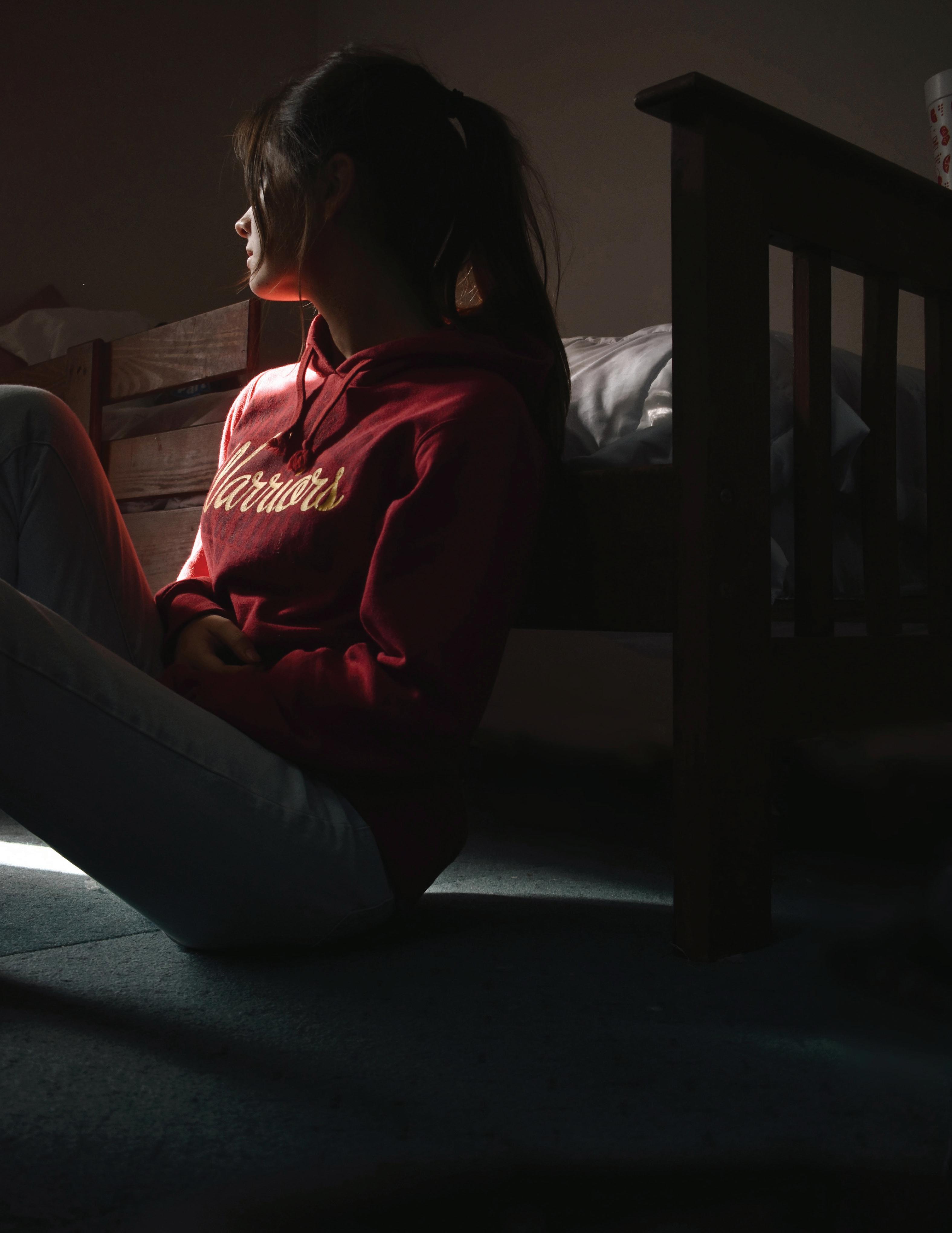 Mary Arcement Alexander, Licensed Professional Counselor & Diocesan Victim Assistance Minister
Mary Arcement Alexander, Licensed Professional Counselor & Diocesan Victim Assistance Minister
October 26, 2002, began as a usual day except for my sister and her children being in town. It was a Saturday morning and we were looking forward to celebrating my niece’s sixth birthday. As we sat around the kitchen table drinking coffee and eating breakfast, my brother’s land line phone rang and they asked me to answer it. As soon as I heard my mom’s crying voice on the other end I immediately knew someone had died. Although I did not want to think this way, my first thought was my dad. Had something happened to him? Was he okay? In those few short milliseconds, I searched my brain to find answers my mom was not giving me fast enough. She then utters the words, “Jody is dead.” Uh? What is she talking about? Jody is only 49 years old, there is no way he is dead. Again, my brain quickly searched thinking it must have been a tractor accident on his farm. My mom then uttered those dreadful three words no one wants to hear, “He killed himself.” And there it was. Hanging in the air like a lead balloon. I simply could not wrap my brain around it all. None of us could. My Uncle Jody was one of the last people I would ever imagine killing themselves and yet he did.
September is National Suicide Prevention Month, and in honor of it, this month’s conversation is all about dealing with mental illness and suicidal ideation from a Catholic perspective. I believe we have five specific tools in our Catholic tool belt that can benefit us greatly when used promptly and with intention. Although my uncle’s death by suicide shocked us all, unfortunately, he falls into a very large pool of people who are more likely to kill themselves: middle-aged white males. They make up roughly 70% of all suicides. According to https://afsp. org/suicide-statistics/, in 2020 men died by suicide 3.88 times more than females, on average there were 130 suicides daily, and firearms accounted for 52.83% of all suicides.
If you feel a sense of doom, know, brothers and sisters, that there is hope! As mentioned earlier, we, as Catholics, have five tools that can potentially combat mental illness and/or suicidal ideation. They are daily Mass, praying the rosary, confession, adoration chapel, and receiving the Holy Eucharist. If you are reading this and thinking to yourself, “Mary, I do all of those things often, and I still struggle with depression and anxiety,” I hear you loud and clear. Let us take a bit of a deeper dive into each one as I further explain how they may help:
Going to daily Mass is simply a wonderful and joy-filled way to begin your day. I like to call daily Mass the “meat” of the Mass because it is just the Word and the Body, all you need to armor yourself for the day. Beginning your day with daily Mass
will put you in a Christ-centered mindset that over time will compound and bring about more peace and calmness into your life.
The rosary is one of our greatest defenses against the wickedness and snares of the devil. Satan wants you to believe that you are worthless and, therefore, should hurt yourself. He is the master of deceit and fear. He also hates when you pray the rosary so pray it repeatedly as you imagine him shrieking away in fear.
Going to confession is kind of like a “mini” therapy session.You can go any day Monday through Saturday, unload your heavy burdens in a safe space, and then truly repent for your sins. Confession lightens the burden of guilt and shame. Confession reminds you of God’s love and mercy. Confession is light to the darkness of sin.
I cannot tell you enough how much I love popping in to see Jesus on any given day at any given time. I will drive across town if time permits in my day to simply say hi to Him. If no one else is there, I will speak aloud to Him. Adoring our Lord is humbling, grounding, peaceful, encouraging, fulfilling, and joyful. I promise you will walk away feeling more alive.
Although this speaks for itself, I want to remind you that receiving our Lord’s Body, Soul, and Divinity is feeding your mind, body, and soul all that is good and holy. The more you receive Him, the more space He fills inside your heart and mind, the more joy you experience, the less pain you feel, and the giant hole of emptiness that once took up too much space inside you slowly begins to close up to a mere pinhole.
God loves you, brothers and sisters. You are worth more than you will ever know this side of heaven. You are His. He is yours. When Satan attacks you, speak loudly these words: “Get behind me Satan. Stand before me, Jesus.”
*If you or someone you know are struggling with mental illness or suicidal thoughts, please call 988, the new Suicide and Crisis Lifeline.
As my friends and I reminisce about our collective childhood experiences usually one figure rises above the chatter, one figure whom we all recognize, different in appearance but similar in character; who epitomizes the safety of home, the triumph of successes (even small ones), the open arms of love and reconciliation, the assurance that all will be well, that we are loved, safe, affirmed and challenged to go beyond our own self imposed limitations. She may be called by different namesmother, aunt, sister, grandmother, godmother, or cousin but she is helping lay the foundation for our lives, helping to shape the lens we see the work of the Divine as well as the work of the world and our place in that reality.
I was blessed to remember spending time with one of my great grandmothers. She taught me to embroider, she prayed with me, she used words like play pretty rather than toys, and when we lost her to heaven, she taught me the distinct pain of the first real loss in my life.
I have been blessed with several wise teachers in my life thus far and have learned so much from their examples. The women at my parish, St. Mary’s are a sure and steady presence in my life today; my aforementioned teachers having joined my great grandmother in heaven. And while they sit in the presence of the Lord I sit in the classroom, the church pew, the kitchen, the parish hall in the company of some wonderful women, sisters in Christ, sisters with whom I share the struggle of not just living and accepting the Catholic faith and way of life, but the ultimate goal of embracing each day the crib and the cross as well as the empty tomb.
I’m not a kid anymore and while it is true we never stop learning, perhaps it is my turn, our turn, to join my sisters and proclaim God’s commands to my granddaughters, my daughters in law, my nieces, and goddaughters, as well as “the stranger.” This thought led me to another one…how do we, as women, proclaim?
Certainly one way is by preparing, cooking, and serving food for the body. The possibilities range from family dinner, to holiday feasts, to funeral meals, compassion can present itself in the form of a casserole for a busy family, or a snack shared with a young child. Intention and attitude are on the list of ingredients as well as those staple items such as vegetables, fruit, and flour. Our equipment is important too…I have in my care and keeping, a drip coffee pot, an old box grater, and a very old and well used flour sifter, wedding gifts to my parents decades ago. When I use them today I feel the hope and happiness they started their lives with. Just like any heirloom they are to be used and cared for and passed on.
Wagon Train Soup was the name she gave vegetable soup which was often made up of leftovers which were added to so there would be enough soup for all.
Basic Vegetable Soup:
1 can stewed tomatoes
1 can chicken broth
Diced potatoes, carrots cut into small slices, celery strung and sliced, one onion diced. (Add green peppers, corn, and green beans if you like them)
Adjust these ingredients to the number of servings you are preparing. Simmer until all vegetables are tender and season with salt and pepper or Creole seasoning.
Add a generous helping of love, a dash of memory, and a heaping spoon of hope. Stir well and serve with all the faith you have!
As a very young child, I hung on every word my great grandmother said, sat with her as we listened to the late Billy Graham on her old black and white television, listened as she read from the bible which was always balanced on the arm of her chair,and tried to imitate like only an eight year old can. As beautiful and cherished as those memories are, the fact is , I “got some proclaiming to do.” I begin to make a mental list of the stories and their accompanying recipes, prayers, and actions I want to share with my granddaughters, goddaughters, nieces, and young cousins.
To attempt sharing my faith by sharing my life with those younger women is part of our proclamation. We as women are guardians of a precious legacy, distinctive and unique but not greater than our brothers in Christ.
Food serves as the physical form of many of the lessons I have learned. Yours may come in other forms. As I meal prep, stir love and hope into batches of jelly, soup, and beans, I pray to be strong enough, faithful enough to be among the great host of women who are proclaiming God’s commands.
My great grandmother, Willie Vance Spruill, cooked many meals which my siblings and I devoured with gusto. She cooked “plain food” and I do not recall a single cookbook in her home. My favorite memory is coming into her house after school on a frosty afternoon. The smell of homemade soup welcomed my brother, sister, and myself into her home; the heat from the stove competing with the cold air outside fogged up every window. We wrote our names and drew wavy pictures using our fingers for pencils until we were called to the table set with love.
The role of a spiritual director is to help another person with that other person’s relationship with God. My own practice and ministry of spiritual direction has been formed by the Holy Spirit through the leadership, patience, dedication, and commitment of many holy women. Their roles, their input, their self-giving, and their willingness to humbly share their own sacred stories have changed my life and led to my own vibrant and loving ongoing conversion. Without encountering these women in my life, I would have lost some of the most holy, hallowed, and cherished experiences of God, and thus lost the graces those experiences have showered over me.
There is Noel who helped me find those mystical moments with God as she helped me sift through the inner movements I’ve experienced and helped me discern which were from him, and which originated from a place other than God.
There is Dorothy who gently showed me how to be present to the always presence of Christ and just be with him.
Janice who, although sadly never in a liturgical setting, has unpacked scripture after scripture in ways that led me to change and called me to action – becoming some of the best homilies I have ever experienced.
Damien who takes real life situations and helps me uncover God in all things and in all people in ways that have moved me to respect life, not because it’s some command from on high, but because we are all connected in Christ, with Christ and through Christ; and to love Christ is to love all people and all of creation.
Marie who has shown me how to live as a contemplative in each moment. To be present to each moment while taking a long, loving look at every aspect, person, place, and thing present at that moment, and encounter God in the entirety of each moment.
Wendy, who after suffering a heart wrenching loss, allowed God to move her into a new ministry of serving people, becoming the presence of Christ for others.
Another Wendy who showed me that God is present in all religions, in all people and in all prayer; but we must prayerfully and contemplatively be always open to His presence.
Dianne who patiently modeled spiritual direction for me which allowed it to change my life.
Luisa who lovingly ministers to individuals with gender identity issues and loves them as the sons and daughters of God they are.
Mother Teresa of Calcutta, who shook my hand and looked me in the eyes as if I was the only life on earth. It moved me to such depths that it took years to realize this is what it means to be present to another person.
There are many other women who have personally affected my spirituality and life with Christ, many who are authors, poets and speakers who bring people to Christ every day. I also must mention those who came before us who have dramatically influenced me spiritually. The lives and examples of Julian of Norwich, Mary the mother of Jesus, Theresa of Avila, and Catherine of Sienna to name a few – all have been leaders who have and still are helping form my relationship with God. And, of course, Mary Magdalene, one of the only two apostles appointed by the Risen Christ (the other was a middle eastern terrorist named Saul), who was still ministering to Jesus even after he died. Her loving care never ceased.
Finally, my mother, my grandmother, and my great aunt who’s quiet, yet profound spiritualities showed me at an early age what having a relationship with God was all about.
As I write this, I can’t help but thank God for the women leaders in the Church since the very beginning. They have all affected us in ways that constantly help us encounter God in rich and in infinite numbers of ways.
“After this, Jesus traveled about from one town and village to another, proclaiming the good news of the kingdom of God. The Twelve were with him, and also some women who had been cured of evil spirits and diseases: Mary (called Magdalene) from whom seven demons had come out; Joanna the wife of Chuza, the manager of Herod’s household; Susanna; and many others. These women were helping to support them out of their own means” Luke 8:1-3.
Without encountering these women in my life, I would have lost some of the most holy, hallowed, and cherished experiences of God, and thus lost the graces those experiences have showered over me.
Mike Van Vranken, Spiritual Director
Han pasado tantas cosas en los últimos cincuenta años que han tenido gran impacto en la vida de la Iglesia que involucra a las mujeres. Pero mi enfoque inicial de este artículo es resaltar mi experiencia con las ellas, como un regalo que el Señor me dio. Permítanme comenzar: Yo soy 1 de 9 hijos., cinco hombres y cuatro mujeres. Yo estaba intercalado entre mis cuatro hermanas, dos directamente mayores que yo y dos menores que me siguen inmediatamente. Aunque puedo asegurar que soy muy cercano a mis hermanas, fue un desafío natural estar justo en medio de ellas. Creo que, si ellas tuvieran la oportunidad, dirían que yo era un típico "hermano" para ellas; y en mi juventud, me metía en problemas haciendo las cosas que los hermanos hacen para irritar a sus hermanas. Por supuesto que el tiempo tiene una forma de curar y mi tiempo con mis hermanas (a medida que madurábamos y nos convertimos en adultos) ha sido una bendición y somos muy unidos. Mi hermana mayor, Maureen, murió la semana que fui anunciado como obispo de Shreveport. Fue una muerte bendecida, ya que ella ya estaba lista para encontrarse con el Señor cuando llegara el momento. No hace falta decir que los ocho hermanos restantes la extrañamos mucho. Maureen era una persona muy sencilla, nunca se casó ni tuvo hijos, ella fue niñera la mayor parte de su vida adulta y poseía una inocencia que la acompañó durante toda su vida. Con la ayuda de ella y mis otras tres hermanas me criaron con responsabilidades compartidas y en una vida familiar. Perdimos a nuestra madre cuando éramos aun pequeños, y aunque su memoria todavía está bastante fresca entre nosotros (casi sesenta años después de su fallecimiento), mi madre tuvo una profunda influencia sobre todos nosotros. Ellas son las mujeres de mi juventud… pero no solo ellas.
Durante los años de mi educación primaria, mis maestras fueron las hermanas religiosas de San José. Lo que no era extraño, ya que mi tía abuela era miembro de esa Orden y estuvo siempre presente en nuestras vidas. Mis maestras de primero, segundo, cuarto, y quinto grado aún viven. Tuve el privilegio de celebrar hace un año, el 70 aniversario de profesión de mi maestra de segundo grado. Hemos seguido en comunicación todos estos años, y sigo recordando las maravillas de estas benditas mujeres consagradas.
Mi primera asignación como sacerdote me tocó trabajar con las Hermanas Benedictinas. Durante tres maravillosos años como sacerdote enseñando en la Academia Mount Saint Mary,
dirigida por las Hermanas de la Misericordia; Algunas de ellas como colaboradoras en educación y otras como mis superioras en la academia. En 1983 me asignaron a una parroquia en el noroeste de Arkansas, donde fui Capellán del Hospital Católico dirigido por las Hermanas Dominicas de Springfield, Illinois. Celebraba misa para ellas todos los días, atendía los enfermos en el hospital y nos reuníamos a compartir los alimentos. También rezaba con ellas y colorábamos, siguiendo sus instrucciones diariamente. Estas mujeres siguen siendo un recuerdo bendito para mi sacerdocio.
Durante mis más de treinta años como sacerdote en la Diócesis de Little Rock, la mayoría de los colaboradores de la cancillería y el tribunal eran mujeres. Algunas de ellas eran recepcionistas, secretarias, supervisoras de departamentos y líderes de la Iglesia local. Ninguna iglesia parroquial pudo haber funcionado sin ellas, ya que formaron el liderazgo, apoyando al párroco para que la parroquia funcionara con eficacia. En verdad, la mayoría de los sacerdotes y obispos les dirán que estamos más rodeados por mujeres que por hombres - un gran contraste en estos cincuenta años. He sido bendecido a lo largo de mis más de 45 años en el ministerio estando rodeado de ellas, incluso hoy. Recientemente, celebramos la fiesta de María Magdalena, – a veces llamada, apóstol de los apóstoles.
La Iglesia es bendecida sin comparación por la presencia de la Madre del Señor, nuestra Madre, María. Es seguro decir también que el proceso sinodal es fuerte por la participación de las mujeres alrededor de la mesa. Su presencia se ve no solo como lectoras, ministros de eucaristía, visitando los enfermos, como miembros parroquiales y de los consejos financieros. Algunas o la mayoría de nuestras parroquias tienen organizaciones que están compuestas por mujeres de la parroquia, y la Iglesia en general continúa prosperando con movimientos espirituales que involucran a estas mujeres sagradas, por ejemplo, aquellas que están involucradas en la dirección espiritual y el trabajo de retiros.
Todo esto es para decir que entre los mayores dones a la humanidad y especialmente a la vida de la Iglesia, está la presencia de las mujeres - mujeres sagradas - mujeres santas, las jóvenes, las maduras, las esposas y madres, las líderes espirituales del rebaño. Por favor, aprécielas por lo que son y lo que hacen y muy apropiadamente nuestra “Santa Madre la Iglesia”, lleva su nombre. ¡Dios los bendiga a todos!
Rosalba Quiroz, Directora
La devoción a Nuestra señora de los dolores viene desde muy antiguo. Ya en el siglo VIII los escritores eclesiásticos hablaban de la “Compasión de la Virgen” en referencia a la participación de la Madre de Dios en los dolores del Crucificado.
Pronto empezaron a surgir las devociones a los 7 dolores de María y se compusieron himnos con los que los fieles manifestaban su solidaridad con la Virgen dolorosa.
La fiesta empezó a celebrarse en occidente durante la Edad Media y por ese entonces se hablaba de la “Transfixión de María”, de la “Recomendación de María en el Calvario”, y se conmemoraba en el tiempo de Pascua.
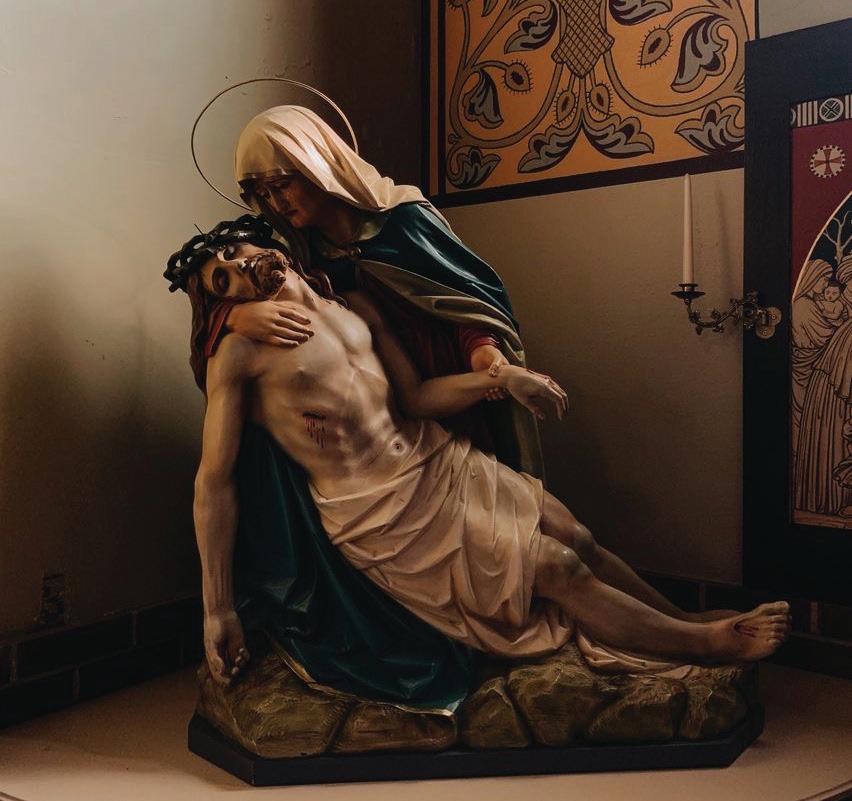
En el siglo XII los religiosos servitas celebraban la memoria de María bajo la Cruz con oficio y Misa especial. Más adelante, por el siglo XVII se celebraba el domingo tercero de septiembre.
El viernes anterior al Domingo de Ramos también se hacía una conmemoración a la Virgen Dolorosa, festividad conocida popularmente como “Viernes de los Dolores”.
Benedicto XIII extendió universalmente la celebración del “Viernes de Dolores” en 1472 y en 1814 el Papa Pío VII fijó la Fiesta de Nuestra Señora de los Dolores para el 15 de septiembre, un día después a la Exaltación de la Santa cruz.
Para ver más artículos de Fe y Doctrina visitar páginas del Vaticano y páginas Católicas autorizadas como la de donde sacamos este artículo:
https://www.aciprensa.com/recursos/historia-de-la-fiesta-denuestra-senora-de-los-dolores-1508
Cabe añadir que el 8 de septiembre celebramos el cumpleaños de la Santísima Virgen María y aunque no es un día obligatorio festivo en la Iglesia, tengamos en cuenta su nacimiento que marca el comienzo de su vida en la tierra.
6 Reunión de Emaús mujeres, Parroquia de Cristo Rey, 9-11am.
10 Reunión de coordinadores Diocesanos, Farmerville, LA, 10am-2pm
CRISTO REY: BOSSIER CITY
Rev. Fidel Mondragon
318.221.0238 Oficina
Domingo 1:00pm
Lunes 7:00pm
Sabado 6:00pm
Coordinador Oscar Gomez 972.567.2710
SAN PASCUAL: W. MONROE
Rev. Luis Jost, OFM
Domingo: 4:00pm
Coordinadora: Lorena Chaparro 318.267.4018
SANTO TOMAS AQUINO: RUSTON
Rev. Kevin Mues
318.225.2870 Oficina
Domingo 1:30pm
Coordinadora: Luz Martinez 318.224.0980
NUESTRA SEÑORA DEL PEPETUO SOCORRO:
FARMERVILLE
Rev. Luis Jost, OFM
Sabados 7:00 pm
Coordinadora: Paola Gonalez 817.801.3499
STA MARIA DE LOS PINOS: SHREVEPORT
Rev. Mark Watson
318.687.5121 Oficina
Domingo 12:30 am
Coordinadora: Alma Mendoza 318.678.9306
SAGRADO CORAZON: OAK GROVE
Rev. Jean Bosco Uwamungu 318.428.2983 Oficina, Domingo 1:00pm
SAN JOHN THE BAPTIST, MANY
Rev. Francis Kamau, FMH 318-256-5680 Oficina • primer domingo 1:00pm
SAN PABLO: MINDEN
Rev. Rigoberto Betancurt
318-458-6045 Cell
2do Domingo 4:00pm
Coordinadora: Dora Rodriguez 870-904-9137
SAN JOSE: MANSFIELD 305 Jefferson Street
Mansfield, LA 71052
Rev. Rigoberto Betancurt 3118-458-6045
3er Domingo 3:00pm
17 Reunión en preparación para Búsqueda # 12., Cristo Rey, 11am-4pm
25 Reunión en preparación para Experiencia Cristo # 11, Cristo Rey, 9am-12pm
First, a diocese is centered on a place. A diocese must be somewhere and contain some geographic space. St. Paul when writing to the communities (dioceses) of Corinth, Rome, Galatia, Thessalonica, etc. had a specific place in mind. While these communities were nowhere near the size – in population or geographic area – than dioceses today, they were still a place you could find on a map. Our Diocese of Shreveport is such a place - incorporating a region that takes up the northern part (almost a third) of the State of Louisiana.
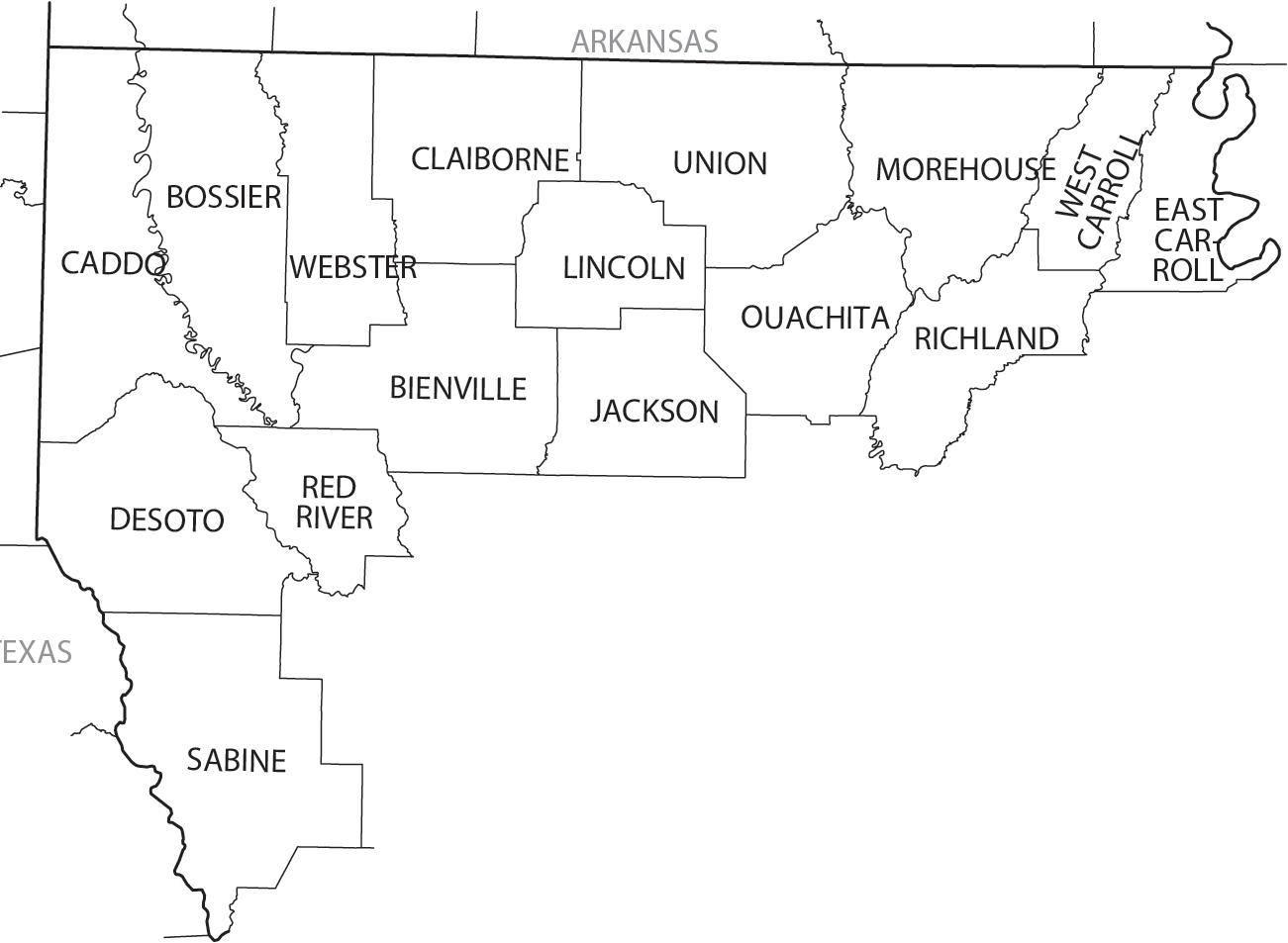
Second, for a diocese to be a diocese, there needs to be a bishop. Again, we can visit the New Testament to witness the installation of one leader or another to an up-and-coming Christian community as one to carry on the work of the Apostles. These leaders (bishops) were carrying out the apostolic succession upon which the Church so readily and earnestly relies. Even to this day, we can say with a great deal of confidence that our diocese – through Bishop Maloneenjoys the fact that it is led by a successor of the Apostles. A quick Internet search at https://www.catholic-hierarchy.org/ bishop/bmalonef.html will provide you an abbreviated listing (back to the 16th century) of the apostolic succession Bishop Malone follows.
The third thing a diocese needs to be a diocese is a Christian community; that is, followers of our Lord, Jesus Christ gathered in one place with the bishop as a successor of the apostles. Possibly the most beautiful and certainly the earliest example
of this “community” is found in Chapter 4 in the Acts of the Apostles:
There was one heart and soul in all the company of believers; none of them called any of his possessions his own, everything was shared in common. Great was the power with which the apostles testified to the resurrection of our Lord Jesus Christ, and great was the grace that rested on them all. (32,33)
Recently, a member of the Annual Diocesan Stewardship Appeal team traveled around the diocese (from Zwolle to Lake Providence) to drop off pledge cards and other materials at all the churches.The team member shared what a wonderful thing it was to “see the diocese”- the people (pastors and lay faithful) who are working and living their lives for the greater glory of God and in service of their neighbors.
How awe-inspiring it is to know our diocese is so closely connected to the Church initiated by Our Lord and is fulfilling the words Jesus spoke to the Apostles so many years ago:
…you, therefore, must go out, making disciples of all nations, and baptizing them in the name of the Father, and of the Son, and of the Holy Ghost, teaching them to observe all the commandments which I have given you. And behold I am with you all through the days that are coming, until the consummation of the world. (Mt 28: 19,20)
In the spirit of the Eucharistic Revival the Diocese of Shreveport will participate in the Diocesan Rosary Congress. If you are unfamiliar with a Rosary Congress, let me briefly explain. The Diocesan Rosary Congress is celebrated annually the first week in October (October 1-7, 2022). The Rosary Congress is 7 days of Eucharistic Adoration and the Rosary prayed out loud every hour day and night for the week. The mission is to bring every soul to believe in and to love deeply Jesus Christ in the Eucharist through Mary and the Rosary. During this diocesan year of the Eucharistic Renewal this will be a great opportunity for our parishes to grow in their faith during Eucharistic Adoration and the recitation of the Rosary. As we introduce the Rosary Congress to our diocese, we will promote a “Traveling Rosary Congress”. The structure of the congress is for one (or more) parish(es) in the diocese to host an opening Mass beginning at 6:00 PM (time set by parish), followed by 1 hour of confessions, a Marian Procession or Eucharistic Procession, with one entire day and evening of Eucharistic Adoration and Rosary recitation concluding with a Closing Mass the following day at 6:00 PM (time set by parish).
The Rosary Congress was born out of the desire of then Pope John Paul II to make a papal visit to his homeland Poland. He would be allowed to visit but the places he would visit would be predetermined by the government. The Holy Father desired to visit other places. Permission was not granted; the trip to his homeland seemed to be in jeopardy.
On May 1st at the Shrine of Our Lady of Czestochowa, the first Rosary of Congress began with continuous Masses, Eucharistic Adoration, and the recitation of the Holy Rosary. A TRIUMPH FOR OUR LADY! On May 7, the last day of the Rosary Congress, the government unexpectedly relented and removed the major obstacles to the papal visit. The Polish people credit the Rosary Congress with clearing the path for the Pope’s visit. Then, whenever Pope John Paul II made any apostolic journey outside of Rome, somewhere in Poland there was a Rosary Congress offered for his intentions and protection.
Our bishops see an urgent need of revitalization of the faith in our country, guided by the Holy Spirit and are calling for a Eucharistic Revival. This is our opportunity to unite together
across our diocese and throughout the US during this week of Perpetual Adoration with the Rosary prayed every hour. What a powerful moment in time for our faith community in the Diocese of Shreveport.
This Rosary Congress will be primarily a laity led endeavor. Please prayerfully consider offering your “YES” to our pastors when they ask you to lead and/or participate. Your “Yes” offered in union with our Blessed Mother, will help bring Jesus, truly present in the Eucharist, to our faith community.
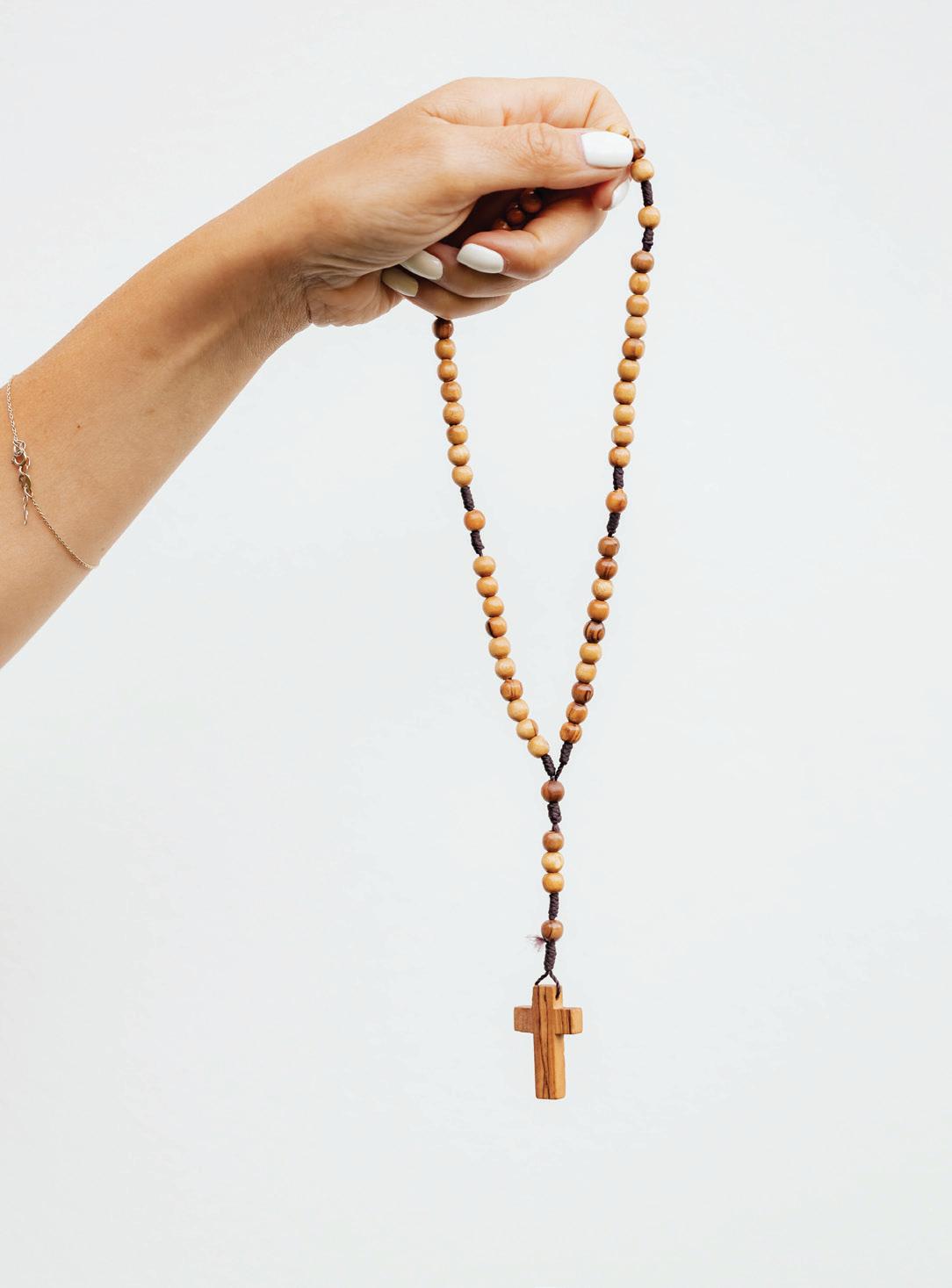
“The more things change, the more they stay the same” might be the underlying theme for the 2022-23 school year at SJS. Enrollment this year is over 300 students, a change that led to additional teachers, but also to a lot of changes in classroom space. Finding space for additional classrooms is a challenge for our school, located in the heart of Broadmoor, but with some creativity and great carpentry, it’s turned out to be just right.
For example, the library was cut in half to make room for an additional fifth grade classroom in the Middle School building, Providence Hall. While it is a strange look to some, to this SJS alum, it’s going back to the way things used to be. The library was originally built to be the size it is now, but at some point it was expanded to include the fifth grade classroom where Mrs Susan Belanger taught fifth grade, when she was my teacher. Turning it in to a fifth grade classroom isn’t so crazy, after all!
With this uptick in enrollment, a lot of classrooms had to shift around campus, beginning with the Kindergarten Village. A new K3 class meant additional space and an additional teacher and aide had to be found; there is also an additional K4 teacher and aide, and a few other changes throughout campus.
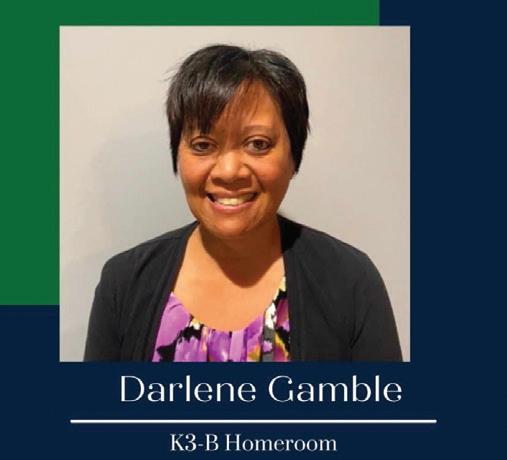
SJS is pleased to welcome the following new faculty to our community: Jane Kelly- 7th & 8th RLA; Alison Marlar- Middle School Social Studies; Jillian McAlpin- 5th Grade RLA & Social Studies; Megan Crim- 3rd Grade RLA & Social Studies; Zach Schonfarber- PE & Boys Basketball; Penny Gwin- K5 Aide; Tenelle Newton- K4B Lead; Carolyn Boley- K4B Aide; Darlene Gamble- K3B Lead; Shanay Washington- K3B Aide.

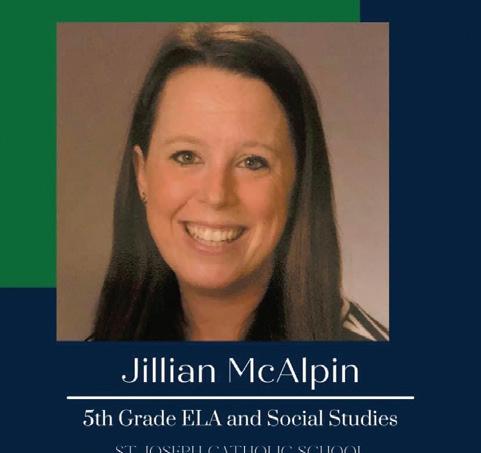
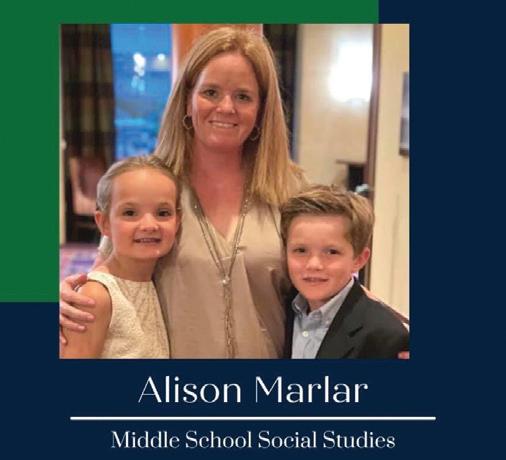

Changes are exciting, but one thing that has not changed is our commitment to “provide an authentically Catholic
education directed towards academic excellence and the formation of each child in the virtues of the Gospel of Jesus Christ.” That is still our mission, and the faculty and staff of SJS are committed to making it happen each and every day.





 Trey Woodham, Principal
Trey Woodham, Principal
Summer is a time for our kids to enjoy the outdoors, fellowship with friends and make many memories that last forever. The all-day SJB Summer Camps from June 6 – July 29 had all that and more. Based on our Catholic roots, living the Catholic faith and in partnership with Loyola College Prep, our experienced SJB teachers and volunteers created a program with a blend of faith, fun and activities! The campers experienced a variety of activities that challenged them spiritually, mentally, and physically.
The one hundred plus campers loved it! They emerged from the camps with new ideas, new skills, new friends,
and new aspirations. But most importantly, they forged lifelong memories, experienced love, and the virtues of kindness and patience.
The goal at the start of the Camps was to nurture each camper’s interest, talent, and their love for God. The SJB Summer Camps provided that opportunity. Plus, it prepared the campers to start the new school year off with confidence and an expanded set of skills. The SJB School Summer Camps for next year will be June 5 to July 28, 2023. All are invited to attend.
Arts & Crafts
Cheer Week
Educational Activities and Games
Field Games
Ice Cream Day
Mentoring in different Sport
Disciplines
Practicing Virtues
Reading Week
Religious Activities
Space Week
Superhero Week
Vacation Bible School
Water Days


Jesus the Good Shepherd School students were all smiles on Monday, August 15 for their very first day of the 2022-23 school year. Students started off the morning with Jesus by attending their very first school Mass of the year and receiving a school year blessing with a sprinkling of Holy Water from Fr. Mike. JGS is ready for a safe, productive and, most of all, fun school year!



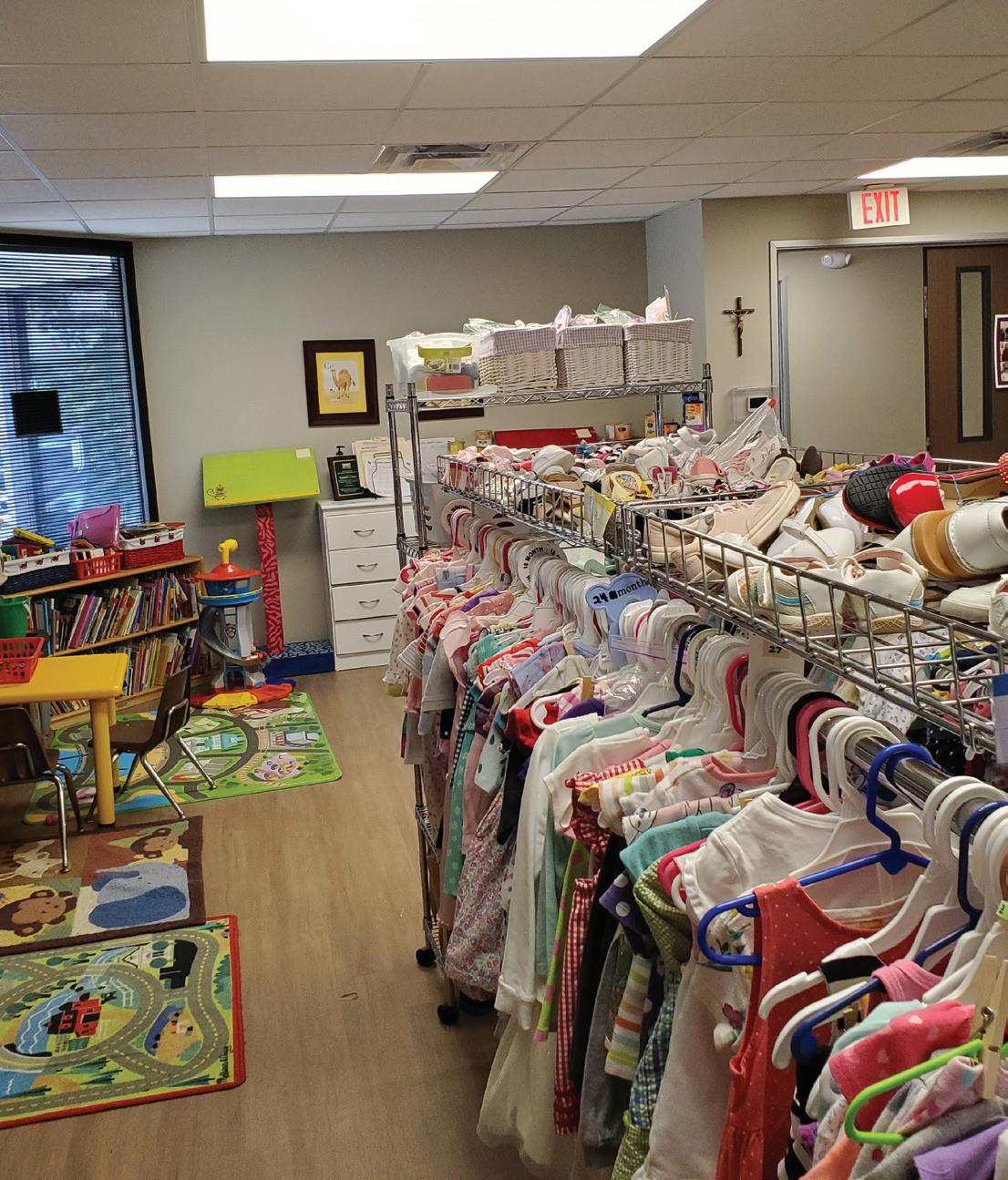 Kathy Schimschock, Development Director
Kathy Schimschock, Development Director
Gabriel’s Closet is a free parenting resource that offers education and essential supplies to families expecting a baby, have a newborn, or children under the age of 4 years old. Gabriel’s closet is run by volunteers who help teach classes, assist clients use their merits for their child and keep the closet stocked. Our hours at the Shreveport office are Mondays and Thursdays from 1:00 pm to 3:00 pm.
The program works on a merit system. Merits are earned by attending parenting classes, doctor appointments, and completing additional tasks that benefit the child and parent. Merits are then exchanged for essential baby items such as Diapers, Formula, Strollers, Car Seats, Highchairs, Clothing, Pack ‘n Play Cribs, Bedding & Blankets as well as Educational Toys and books.
In July, Dr.Thomas Latiolais, a retired pediatrician and parishioner of St. Jude, joined our team of volunteers and began teaching Gabriel’s Closet parenting classes. His insight was very helpful as he answered questions from mothers about discipline, nutrition and the importance of reading to their children as infants and beyond. Dr. Latiolais encouraged them to be the best mothers they could be and told the young mothers and mothers-to-be, “Remember, all the choices you make in caring for your child are out of love.”
Educating our clients about parenting is only a small part of what we do at CCNLA. Parents who feel confident and competent when parenting their children is empowering. Making a difference in our client’s lives helps us make a difference in
the lives of the children they are raising. Clients attending parenting classes learn about breast feeding, immunizations, potty training, discipline, the importance of play and praising children. Our staff and volunteers teach classes for clients at 1:00pm every Monday and Thursday in the Shreveport office.
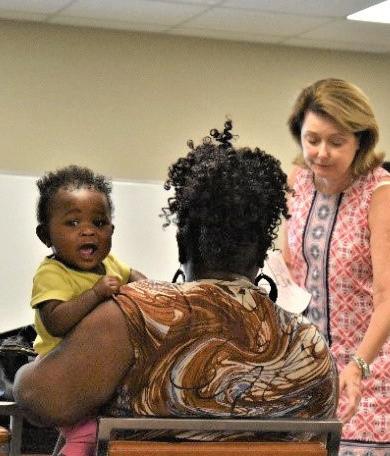
Partnership agencies assisted our Monroe office this past spring with Pack ‘n Play portable cribs for the Monroe Gabriel’s Closet clients. Kirsten Gladen, Regional Manager CCNLA Monroe said, “The partnership with Louisiana Department of Health (LDH) and Blue Cross Blue Shield (BCBS) of Louisiana was for their “Safe Sleep Champion” Initiative.” Catholic Charities was selected to be a recipient of the grant LDH applied for thru BCNS. Kirsten made it clear that, “The purpose of this particular grant is Sudden Infant Death Syndrome (SIDS) prevention. Through the “Safe Sleep” curriculum, expectant mothers learn how to prevent infant deaths, an issue that impacts Louisiana and the nation.” Each year in the U.S., more than 28,000 children die before their first birthday.
Donations to CCNLA are always accepted and appreciated. Gift cards from Walmart or Target allow us to purchase car seats and large items that we do not have room to store at our new offices. New or gently used clothing, shoes, and blankets for children ages 4 and under are always welcomed as well as diapers and formula. We welcome you to stop by our new office located at 902 Olive Street, Shreveport and see for yourself what your donations can do.
Brenyn and Jaeger Ebarb had so much fun at the Mission Possible camp last year, they were disappointed to hear it would not be happening in 2022. So they took matters into their own hands.
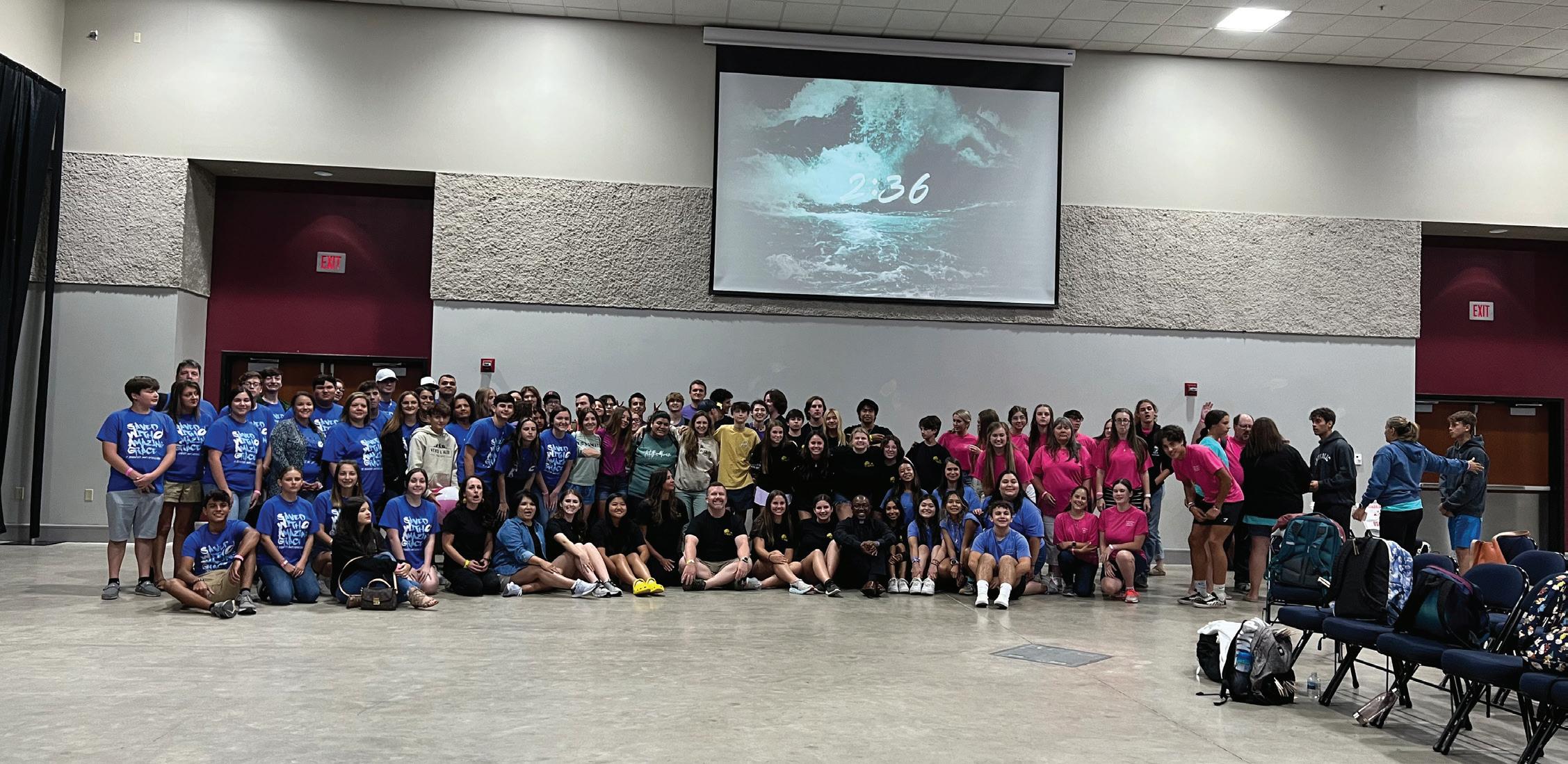
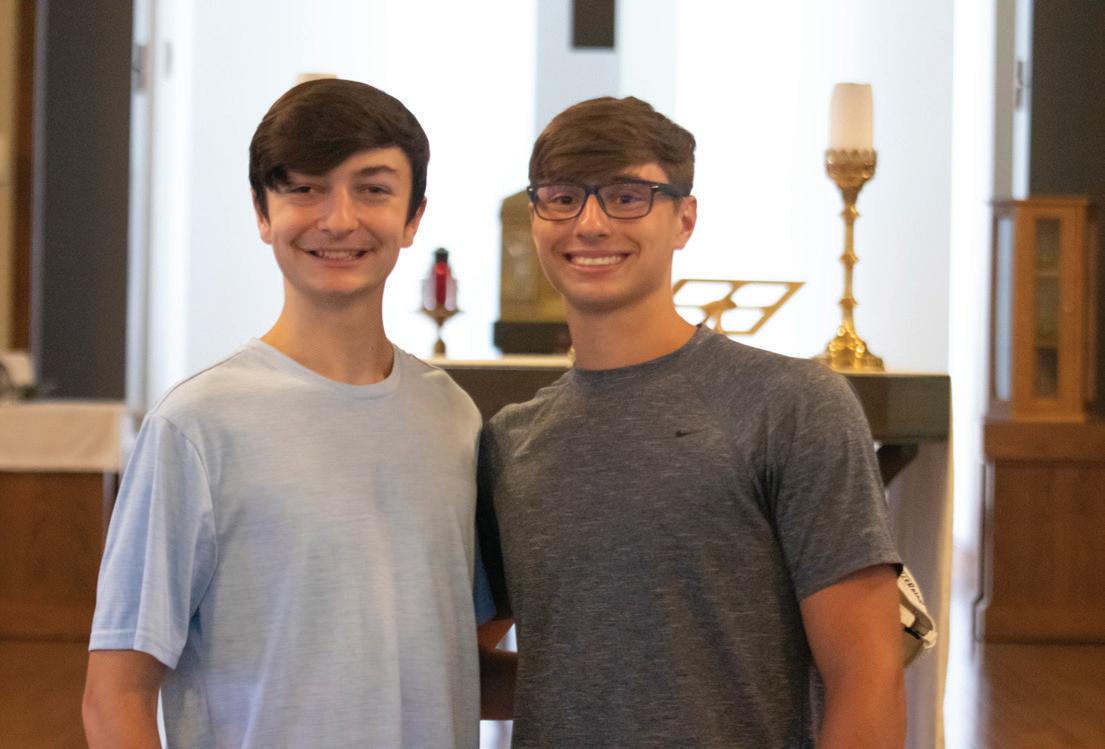
“It’s all about discernment, and about deepening our faith, it’s a possibility to help others,” Jaeger said. They decided they would do it themselves. “And well,” he added with a laugh, “it looks pretty good on a resume.”
They had to do a little extra recruiting since people weren’t expecting the camp to happen, but by the time camp week rolled around, they had sixteen guys, including themselves signed up to go.
Every morning of the camp, the guys helped out with Vacation Bible School at Saint Joseph Parish in Zwolle and took the rest of the day for lots of outdoor activities such as swimming, kayaking, basketball, volleyball, and so much more! They also held morning and evening
prayer, attended daily Mass, and visited with Father Peter Mangum, Vocations Director.
Father Keith Garvin, Pastor of Saint Joseph Parish says, “I think it was a huge success! The guys seemed to respond well to all the activities including the spiritual side of things!” We are so proud of these young men for taking the lead and making this happen!
FRIDAY, SEPTEMBER 16TH
8:15 AM ST. JOSEPH SCHOOL, SHREVEPORT ANNIVERSARY MASS
FRIDAY, SEPTEMBER 23RD
12:10 PM MASS IN THE CATHEDRAL OF ST. JOHN BERCHMANS
SATURDAY, SEPTEMBER 24TH
4:30 PM OUR LADY OF FATIMA PARISH 70TH ANNIVERSARY MASS
SUNDAY, SEPTEMBER 25TH
8:00 AM MASS IN THE CATHEDRAL OF ST. JOHN BERCHMANS
FRIDAY, SEPTEMBER 30TH
12:10 PM MASS IN THE CATHEDRAL OF ST. JOHN BERCHMANS
JOIN OUR NEW EMAIL NEWSLETTER!
Do you want to know more about what’s going on around the Diocese, but don’t want to wait for the next Catholic Connection issue to come out? Join our new bimonthly diocesan email newsletter!
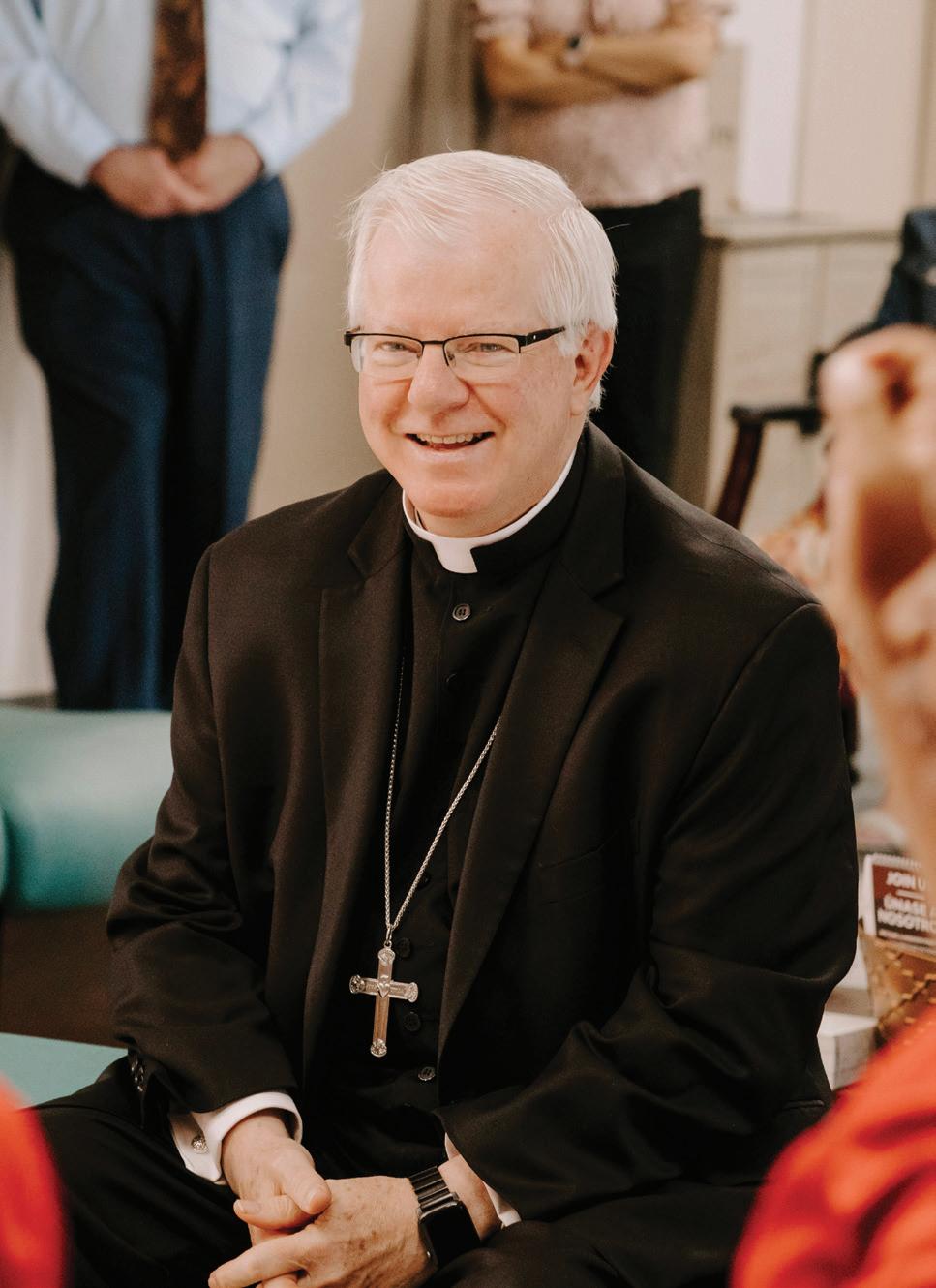
Just go to www.dioshpt.org/newsletter to sign up or email Ben Luckett, Director of Digital Evangelization at bluckett@dioshpt.org
Director of Development
Director of Family Life Admin. Assist. IT Support
Please send resumes to Deacon Michael Straub at mstraub@dioshpt.org.
Caretaker (Cathedral)
Please send resumes to Greg Laroux at glaroux@sjbcathedral.org.
Is your parish hiring? Email Kierstin at krichter@dioshpt.org
SEPTEMBER 3
St. Gregory the Great
SEPTEMBER 8
The Nativity of the Blessed Virgin Mary
SEPTEMBER 9
Saint Peter Claver
SEPTEMBER 13
Saint John Chrysostom
SEPTEMBER 14
The Exltation of the Holy Cross
SEPTEMBER 15
Our Lady of Sorrows
SEPTEMBER 16
Saints Cornelius & Cyprian
SEPTEMBER 20
Saints Andrew Kim Taegon, Paul Chong Hasang & Companions
SEPTEMBER 21
St. Matthew the Evangelist
SEPTEMBER 23
St. Pio of Pietrelcina
SEPTEMBER 24
Our Lady of Mercy
SEPTEMBER 27 19
St. Vincent de Paul
SEPTEMBER 29
Saints Michael, Gabriel, & Raphael, Archangels
SEPTEMBER 30
St. Jerome
SEPTEMBER 2
Copy Deadline for the October Catholic Connection
Theme: “Respect Life Month”
Deadlines are the first Friday of every month. If you have any questions, contact Kierstin Richter at krichter@dioshpt.org.
SEPTEMBER 23-25
Rachel’s Vineyard Retreat
If you or someone you love is hurting from an abortion, please call 318-588-1064 for information, or visit the website at www.rachelsvineyard.org. Absolute confidentiality is maintained by team members and participants prior to, during, and following a Rachel’s Vineyard Retreat. A Rachel’s Vineyard retreat in Spanish is scheduled in the spring of 2023.
SEPTEMBER 24 4:30 PM
70th Anniversary Mass @ Our Lady of Fatima, Monroe
There will be a 70th Anniversary (Platinum) Mass on Saturday, September 24, 2022 at 4:30 pm, at Our Lady of Fatima Parish in Monroe, Louisiana. The Main Celebrant and Homilist will be Bishop Francis I. Malone.
OCTOBER 1 7:00 AM - 2:00 PM
Mary Queen of Peace Parish Garage Sale @ MQOP Fellowship Hall
The Ladies Guild of Mary, Queen of Peace Parish will be hosting a gigantic garage sale on Saturday, Oct. 1 from 7 to 2 in the Fellowship Hall. Proceeds from the sale will go toward special projects of both the Ladies Guild and the Youth Group. The church is located at 7738 Barksdale Blvd. Bossier City 71112.
OCTOBER 13 5:30 PM
Gala @ Cathedral of SJB Parish Hall
Cathedral of St. John Berchmans’ Music Ministry, invites you to a Gala - “For the Love of Music.” Come and enjoy an evening filled with beautiful music and singing from our own music ministry. Great food, drink, fun, and fellowship is on tap as well as a silent auction.
This is a ticketed event. The cost per person is $50. All proceeds go towards supporting the Music Ministry, which includes our cantors and singers, and maintaining the Cathedral’s organ. For tickets, go online at www.sjbcathedral.org or contact the Cathedral Office at 221-5296.
NOVEMBER 6 4:30 PM 8:30 AM
The Black Catholic Committee at Saint Mary of the Pines Catholic Church will celebrate its 6th Annual Black Catholic History Month celebration. The Mass celebration will be followed by a reception in Vandegaer Hall. This year, we will honor Very Reverend Rothell Price and three religious orders that have had a significant impact in the formation of black priests. The orders include: the Society of Divine Word, the Society of African Mission and the Society of Saint Joseph of the Sacred Heart.
Thanks to our Recent Donors:
(011) Anonymous Donor ($271)
(022) Anonymous Donor ($50)
(036) Mr. & Mrs. Ronald M. Rice ($500)
(045) Mary Lucille Rivers ($100)
(036) Mary Lucille Rivers ($100)
(035) Mrs. Rosemary C. Ward ($1000)
(015) Mr. & Mrs. Aaron L. Lirette ($500)
(035) Chris A. Ward ($250)
Completed Burses:
(001) Fr. Mike Bakowski Memorial Burse #1 ($10000)
(006) Msgr. J. Carson LaCaze Memorial Burse #1 ($10000)
(010) Memory of Rita Scott from the John Scott Family Burse ($10000)
(011) Rev. David Richter Memorial Burse #1 ($10000)
(012) Jack E. Caplis, Jr., Memorial Burse ($10000)
(013) Mary Evans Caplis Burse ($10000)
(014) Bob & Peggy Semmes Memorial Burse ($10000)
(019) Margaret Glenn Memorial Burse ($10000)
(020) Dr. James V. Ward Memorial Burse ($10000)
(026) Sheryl Seal Sweeney Memorial Burse ($10000)
(027) Rev. Richard Lombard Memorial Burse ($10000)
(027) Rev. Richard Lombard Memorial Burse #2 ($10000)
(031) Pearl Heck & Leona Boudreaux Memorial Burse ($10000)
(033) Beryl K. & Joseph D. Ozenne Memorial Burse ($10000)
(040) Father Isidore Armand Quémerais Burse ($10000)
(041) Father Jean Pierre Burse ($10000)
(042) Father Jean-Marie Biler Burse ($10000)
(043) Father Louis-Marie Gergaud Burse ($10000)
(044) Father François Le Vézouët Burse ($10000)
Incomplete Burses:
(001) Fr. Mike Bakowski Memorial Burse #2 ($1350)
(002) Joseph & Antoinette Bakowski Memorial Burse ($3150)
(003) Sam R. Maranto Memorial Burse ($1650)
(004) Kathryn Atherton Cook Memorial Burse ($350)
(005) Cathedral of St. John Berchmans Burse ($1200)
(006) Msgr. J. Carson LaCaze Memorial Burse #2 ($3832.12)
(007) Dr. Carol Christopher Memorial Burse ($1200)
(008) St. Jude Parish Burse ($6218)
(009) St. John Berchmans Knights of Columbus Council 10728 Burse ($1550)
(011) Rev. David Richter Memorial Burse #2 ($4300)
(015) Bishop’s Seminarian Burse ($3910)
(016) Elaine Malloy Frantz Memorial Burse ($1000)
(017) Msgr. George Martinez Knights of Columbus Council 1337 Burse ($8021.57)
(018) Knights of St. Peter Claver Council 144 Burse ($1180)
(021) Rev. Edmund “Larry” Niehoff Memorial Burse ($2000)
(022) Rev. Blane O’Neil, OFM Memorial Burse ($1250)
(023) Msgr. Edmund J. Moore Memorial Burse ($1020)
(024) Rev. Joseph Puthupally Memorial Burse ($1100)
(025) Kathleen Hightower Memorial Burse ($400)
(028) Friends-n-Faith Burse ($300)
(029) Rev. Kenneth Williams Memorial Burse ($200)
(030) Ottis and Anne Krupa Littlejohn Memorial Burse ($5000)
(032) Madeline and Joe Tiller Memorial Burse ($1000)
(034) Joseph B. and Lucille Provenza Cordaro Burse ($6000)
(035) Dr. James V. & Rosemary C. Ward Burse ($8000)
(036) Msgr. Earl Vincent Provenza Burse ($1700)
(037) Manuel & Catherine Licciardi, and John & Beverly Miller Burse ($4000)
(038) The Malone Family Burse ($250)
(039) St. Elizabeth Ann Seton Knights of Columbus Council 9260 Burse ($250)
(045) Sister Martinette Rivers Memorial Burse ($100)
The Diocesan Seminary Burse Program provides the faithful of North Louisiana the opportunity to invest in the education and formation of our seminarians into holy and effective priests to serve the Diocese of Shreveport. Interested in contributing to or establishing a burse?
You can establish and name a burse with a donation of at least $250 or you can contribute any amount to a burse simply by designating its name when the contribution is made. Contributions may be mailed to the Office of Church Vocations, Diocese of Shreveport, 3500 Fairfield Avenue, Shreveport, LA 71104. Be sure to note the name of the burse in the memo line. Burses are completed at $10,000.


DIOCESE OF SHREVEPORT

3500 Fairfield Ave. • Shreveport, LA 71104
Catholic Connection USPS 024-824 is published monthly except for July by the Diocese of Shreveport, 3500 Fairfield Ave., Shreveport, LA 71104. Periodicals Postage PAID at Shreveport, LA 71102. POSTMASTER: Send address changes to Catholic Connection, 3500 Fairfield Ave, Shreveport, LA 71104.